My Story......

by
Frank F. Rugebregt
My Story......

by
Frank F. Rugebregt
~~~~~
To all my children and my grand children who know so little about my background and have grown up here in the United States of America, and to my wife Willy who through all the years have stood by me and whom I owe an immense debt of gratitude........
~~~~~
Shelton,
Washington, December 12, 1991
Los Banos,
California, April 30,1999
My Story......
Chapter I 3
My Youth 3
Chapter II 3
Life in the “Royal Netherlands Navy” (Koniklijke Marine) 3
“Home again..” 3
“Return to the Mother Country” 3
Chapter III 3
Back to Civilian Life 3
Chapter IV 3
Life in these United States 3
Chapter V 3
Retirement 3
.
I was born in Blitar, the Netherlands East Indies, on December 14, 1925 a son of mixed Dutch and Indonesian blood. The only child of Johannes Karel Ferdinand Rugebregt and Sophie Sarinum-Rugebregt.
(In 1945 this was to become the Republic of Indonesia and on August 1950, all Dutch military personnel left, and only a small contingent stayed as Military advisers.)

Johannes Karel Ferdinand Rugebregt & Sophie Sarinum Rugebregt
with their son Frans Ferdinand Rugebregt, Blitar 1928
There is not much that I can remember from my early childhood.
All I know, is that as an infant I was sent to my father’s brother, Johan
Rugebregt and his wife Ceciel, and they took care of me for a monthly fee. They
had four children, two sons, Maurits, Herman, a daughter Louise, and the
youngest son John. Later I was told by my parents that the reason for this was
that my mother was a malaria patient and for her and my safety it was better
that I not live in malaria country, and it was decided that I would go to his
brother in Madjalenka, so that they were able to take care of me. Every year my
father would come down from the plantation to take me home for a months vacation.
My father was part owner of a small coffee plantation with a processing plant
to process the coffee berries. It was located in East Java about a two hours
drive from the nearest town of Blitar and then one hour on horse back, as the
last part of the road was not suitable for vehicular traffic. Life on the
plantation was something very different than in the city, and very primitive,
there was no electricity until five o'clock in the afternoon, all
transportation was on horse back, and the only housing was that of the
employees. The plantation was huge in my estimation as a six year old, although
I don't to this day know exactly how big it actually was acreage wise. I know
that my father used to make two rounds on horse back every day in the morning.
He was home for lunch and then off again after lunch. The coffee bushes were
planted in rows on the hill side with shade trees every ten or so bushes, so
they were actually growing in the shade. It was all maiden land just recently
cleared from jungle growth. Behind our house was a small river about fifty feet
wide and at some places about three feet deep. I used to play there a lot and
at the end of a working day, the local farmers came there to wash and water
their water buffaloes. I spent many hours riding the backs of these huge
beasts. On the other side of the river was a cleared strip along the riverbank
and behind that jungle.

My Father shot this panther out the kitchen window, across the stream. Blitar,1926.
Going back to my uncle’s in town was always a sad experience.
By now I realized that there was no school on the plantation that I could
attend and that life on the plantation was pretty isolated and rough. In spite
of all that, I wished that someday I could stay with my parents. My uncle moved
to another town in west Java named Bandoeng, and two years would pass until one
vacation my father came and took me home for another month long vacation. On
the journey home my father told me that he no longer lived on the coffee plantation.
He had sold his part, in 1937 and moved to Kamal on the island of Madoera
across the strait of Madoera from the big port of Soerabaja. My father had an
older brother there, Mathijs Rugebregt and they both had started a new
business, a lime processing plant. This is where the lime stone is processed
into lime for building and industrial use. The plant was something very
fascinating for me, all those huge machines and the huge furnaces. My fathers
older brother Mathijs Rugebregt, was the one who talked my father into this
business venture, which by now was not doing so well, and finally had to be
shut down, for whatever reason I never knew. It was all very impressive to a
nine year old. They were in the process of building our house, and we lived in
a bamboo cabin for the time being.

It was time to go back to my uncle’s in Bandoeng, but I wondered why I couldn't stay, as we were only seven kilometers from the nearest town, and across the strait was the big town of Soerabaja where I could go to school. I didn’t know what the reason was, and so I went back to my uncle.
The older I got the more I resented staying with my uncle’s family. I started to realize that I was not a true member of the family, but a nice source of extra income as my father paid for my room and board, clothing and schooling. My aunt was not the nicest person to me and took every opportunity to degrade me let me know that one day I would end up in a juvenile facility for bad boys.
Finally the day came that my father was to take me home for another vacation, and the next day we set off for home. The journey took a full day. We went by train from Bandoeng to Soerabaja, then by ferry across the strait to Kamal, and from there by horse-drawn cart to our house which was about six kilometers from the ferry terminal. I did not mention anything to my father about not wanting to go back to my uncle’s because I wanted to wait until we were safely home. I remember my mother and I both crying when we saw each other, and I was so glad to be home. By now our house was all finished, and we did not live in the cabin anymore. After a bath and something to eat we all sat on the veranda overlooking the strait. We watched the lights of the city as my father pointed out several parts of the harbor and the city.
I was ten years old then and felt very secure with my parents. It was June 1936, and a new episode in my life was about to begin.
The next morning after breakfast, I asked my father if I did not have to go back to my uncle’s family, and if I could stay home and go to school in Soerabaja. It was not that far to go to school and I could ride the ferry back and forth to Soerabaja to go to school.
I remember my father sitting across from my mother and me, twirling his thumbs, a sign that he was in deep thoughts, and finally asking me why I would not go back. It all came out in an unstoppable flood, a year’s worth of frustration and several years, for as long as I was able to remember back, of verbal abuse by my aunt. She always said I was dumb, good for nothing and lazy, and one day would end up in a correction school for boys.
I begged my father not to send me back, and I must have cried for some time with my head on my mother’s lap who was also crying.
My father got up and all he said was: ”I am going to write my brother that you are not coming back and that I will send him a month’s boarding money.” I felt so happy and relieved. Later that day I had a long talk with my father as he read me parts of the letter he wrote to his brother, explaining why I would not go back and that I could get adequate schooling in Soerabaia. He told me that he knew that I was telling the truth and hoped that it was all over now. I was ten years old and finally had a home and family of my own, I was a very happy child.
The years that followed where the most wonderful and happy years in my life. I had all the love and affection that I missed so much while at my uncle’s house. My father was strict but fair and always listened to my side of the story before passing judgment. I had my share of corrective actions, but at least I always knew what I did wrong. I have never lied to him or my mother nor did I ever hide anything from them. I had a lot of catching up to do as far as family life was concerned. No longer was I put down and my father encouraged me to be the best or at least try my hardest to be.
The business did not do so well, and finally it was closed down and all the machinery was sold and hauled away so all that was left was the building and a few odds and ends. All my father had left was the fifty acres of land that was in my mother’s name, and the house. All of this had not much impact on me at that time.
I went to school in Soerabaja and, since the school day started at seven in the morning, I had to get up at four thirty. I caught the bus at five which took me to the ferry. The ferry ride across the strait got me to the ferry building in Soerabaja about six thirty, which gave me ample time to take the tram to school. School got out at one in the afternoon so I was usually home around three. Days went by fast and I enjoyed life to the fullest and was never happier. After grade school I passed my exam for technical high school, and now my school schedule became a little more complicated. The school was a little farther away than my grade school and the hours were different, so I decided to ride my bike to school. The only difference was that now I had to peddle my bike to school instead of going with the tram. Also three days a week; Monday, Wednesday and Friday, I had afternoon classes from one thirty until four o'clock. These were mostly lab classes in black smith, machine shop, and drafting. Tuesday, Thursday, and Saturday I was home at three o'clock and had time after a quick shower to hang around with the guys until supper time. Homework was usually done after supper or on the ferry. We had no electricity, so when I had drawings to do, I lit up the old Coleman lantern for better light. I remember that I needed a drafting board and that I had one made by a Chinese cabinet maker in town from soft wood with teak runners on the side for my T-sqaure. It cost me a fortune of two rupiah which was the equivalent of 75 cents American in 1939.
It was now 1940 and the political climate in the world was changing. In Europe the Germans were on the march and soon the Netherlands were occupied. Thus we were involved in World War II. In Asia it was Japan that was on the war path and things were really not looking that good. My father told me that sooner or later the war would come to our islands too. He was an ex-military man and wanted me to attend the Military Academy, but I didn’t feel much for it and would rather pursue a technical career. I think that unknowingly I disappointed him in not wanting a military career, but he never pushed it. There was a lot of talk about joining the armed services. The draft was already implemented and the National guard was mobilized.
One afternoon in June 1941, it was vacation and I was hanging around with friends when one of the guys mentioned that he was going to enlist in the Army Corps of Engineers. He was seventeen and in his last year of tech-high. We younger ones looked up at him in awe; he was a hero, and we were sorry that we were to young. The minimum age was seventeen and most of us were fifteen or sixteen. There were seven of us boys and four girls who used to pal around together and swap stories while riding our bikes around the neighborhood. After the war, I heard from my father that our pal Evert Pieters was killed in action when the Japanese landed at Java. But he didn't know exactly where.
One day there was an ad in the paper from the Royal Dutch Naval Air Force for apprentices to join. The apprenticeship was three years, followed by six years of regular service. The gang got all excited. The first three years were nothing but full time schooling in aeronautics and aircraft maintenance and the training was to be at the Naval Air Station “Morokrembangan” in Soerabaja. It sounded all so good to us hotheads. You got paid while in school, room, board, and clothing was free. What else could you wish for? We agreed that we all would talk to our parents and get together the next day. Afterwards I often wondered what went on in our parents’ heads when we approached them about this.
That evening after supper I approached my father with our idea and at first he said nothing but just let me jabber on. Then after a moment of silence, he said that he had read the ad, and asked me if I really wanted to join and what was my reason. Well, I had to make it sound good so I said that this was a good opportunity to learn aeronautics and it would save my parents a whole lot of money. He then asked me if I realized that we were a country at war with Germany and that the war sooner or later would come to our islands, as Japan was an ally of Germany and was already on the move in Asia. We had broken off all diplomatic relations with Japan. I had never given it a thought so I said, “Well, I guess I have to fight the Japs then.....” After a little while he said that I could send away for the recruiting form. The following day when the guys got together we bragged about how tough it was to get our parents permission. Two of the five got permission. The others were either too young, or their parents didn't want to hear about it.
There followed a time of tension as I was waiting for an answer from the Navy. After a few weeks I was called to the Navy Camp “ Goebeng” for some test and a medical exam, and send home without an answer and told that I would be notified by mail if I was accepted or denied.
Some more waiting and in the meantime I was back to school, were one day I was called in the principals office and was told that the Navy had send an inquiry about my school performance and there was nothing wrong with it and that I was given “good” recommendations.
The condition of the contract indicated that you needed to be sixteen by December 31,1941. I just made it as my sixteenth birthday was December 14,1941.
Some more weeks of waiting and in the meantime during the vacation I had an apprentice job at a small ships wharf, were I spend four days a week learning the machinist trade, the time counted for credits of my schoolwork. I made 5 cents a day for lunch money...!!!! I spend 2 cents and pocketed 3 cents...!!!!! Every day at four I would bike into town and met with the “club” and we rode around and I had 3 cents enough to buy my girlfriend and me a glass of shaved ice with syrup and young coconut meat.
Finally word came that I was accepted and had to report to the Naval Base for duty on August 10, 1941, at 9:00 AM.
And so I was about to leave the house and strike out on my
own, and I had no idea at that time what was in store for me.....!!!!
~~~~~~~~
On August 10,1941, my father and I went to the naval base in
Soerabaja. At the gate we said
goodbye, and I went inside to sign up.

Koninklijke Marine, August, 10-1941
A whole new world opened up to me. There were about ten other volunteers waiting inside the building and after preliminary registration and issuance of copies of our contract, we were led to the barracks where we were assigned a bed. At that time we were left alone with the warning that we were not to wander all over the compound but to stay in the immediate vicinity of the building. Dinner time was at five, and ''taps'' at nine. The smoking lamp went out at the same time so that we were only allowed to smoke in the mess hall or outside the building.
After dinner we just hung around and smoked, getting acquainted with the other new recruits. They were all of our age group, fifteen or sixteen and all had signed up for the apprentice program for aeronautics.
The following day it was reveille at five thirty and breakfast at six. I was used to getting up early, anyway, and at seven we were all assembled and marched to a hall where the base commander, a vice admiral welcomed us in the navy and explained that after we have taken the oath we would be property of Her Majesty's Navy and fall under the navy rules and laws which would be taught to us during our basic training. He ended with the question if there was anybody who wished to withdraw. When nobody responded he continued with administering the oath of loyalty and allegiance to the Crown, and signing our contracts.We were now in the Navy, bound by a contract of nine years. I don't think that it really sank in to us. All I realized was that I was now in the navy as an apprentice aircraft maintenance technician and that I soon was to start my training and get paid also. Next we were marched to the ships store and were issued our work uniforms, shoes, caps, hammocks, and a sea bag and were told that upon return to the barracks we were to change in uniform, pack our civilian clothes, and in an hour to assemble outside the barracks where we had to wait for our transportation by busses to the Naval Air Station “Morokrembangan”.
It is amazing how quick one gets the sense of discipline and order. Here we were just barely in uniform and already we lined up two deep, and roughly by height.
Boot camp hadn't even started yet!!!
We were loaded in trucks with our baggage, and a Marine lance corporal was put in charge, and off we went to the Naval Air Station, there were thirty-six of us.
When we arrived I noticed that there were already other
recruits to watch us unload and go through the motions of assignments.

“Morokrembangan” Hangar 6 - Soerabaja August 1941
We were lined up again and divided in groups of twelve, and each group was assigned a marine corporal as senior hand who was responsible for the daily discipline and “well being” of the group. After we were assigned our bunks, the marine corporal showed us how the bunks had to be made up and what the daily routine orders were. It was then that I met Ben Portier who was to sleep on the lower bunk underneath me. He was to become my best friend from then on until this day. He lives now in Inglewood, California and we are still in touch with each other.
At five we had dinner and after that we had free time and we used that to organize our lockers, mark our clothing and get more or less organized.
We were housed in a converted hangar which was ideal in the tropics, as it was airy and cool. Half the hangar was dormitory and the other half was mess hall and recreation room. In one corner of the recreation room was a canteen set up where we could buy soft drinks, cigarettes, toilet items and some other items. Soon the place would be called simply “Hangar 6.”
We were told that the next morning right after breakfast everybody has to fall in by group number and each group was to be assigned its daily routine for classes and drill for the whole week. Boot camp had started!
The weeks following were filled with drills and drills and maybe one class a day in navy regulations, the Queens orders, ranks and organization, and weapons theory. The first week everybody had blisters on his feet and hands, and at the end of the day we were bushed, but soon we got used to the routine and life went on. We knew that after basic training we would go to regular technical classes. The most exiting part of boot training I found was the rifle range.
-- My father had taught me at a very early age gun safety and how to handle and shoot a rifle and took me hunting many times. At twelve he gave me a rifle to take hunting and to take proper care of It was a Manlicher carbine, and I shot two boars before I was fifteen. --
One has to remember that the Netherlands was occupied by the Germans and the Royal family was in exile in England and in Canada. Indonesia, the Netherlands East Indies, was the biggest colony that was still under Dutch rule. After the fall of Holland in 1940 the Navy Academy and the Academy of the Army were opened at Soerabaja and Bandoeng. At Soerabaja, the main Naval base, different schools for the different branches of the Navy were opened. The naval air station where we were was also part of the navy establishment and we were the first class of aircraft maintenance technicians.
After four weeks of drilling and lectures we were finished with our basic training and were issued dress uniforms and could go ashore, but not so fast, as we had to wait another week before we could leave the base and go ashore for liberty. There was a “liberty boat” in the form of a bus especially for the apprentice classes, and that first Saturday we could go ashore after five in the afternoon and have to be back on the eight o'clock sloop, as we were still under age and after all the navy was responsible for us, and we had to be back “on board” before “taps” at nine o'clock. There was not much time to spend ashore that first night, and I went only to a Chinese restaurant and hung around down town, window shopping, close to the bus stop, and at eight o'clock the bus came and we went back to camp. I noticed that there was a sign on the bus. It said “Hangar 6”, and I thought, “Good, they don't have to know that we are only apprentices!”
Two weeks later we were allowed to spend a whole weekend ashore overnight, but only with family, and we must have our passes signed by the head of the household. It may sound silly, but one must not forget that all of us were still under the age of twenty-one, and most of us were not even sixteen, me included. As I lived in Kamal which was across the strait and in another city, I had to obtain a travel pass and a ticket for the ferry, and the next Saturday a friend of mine, Gijs van Dorssen, who also lived in Kamal and was one of the old gang, headed home with the first liberty boat at two o'clock. How cocky we felt in our dress white uniforms smoking Lucky Strike's instead of the local brands. We could get the cigarettes duty free in the canteen and I had a carton in my weekend bag for my mother
I don't recall what my parents said when I stepped in the
house. It had been six weeks since I had been home. I changed into civilian
clothes, and we sat on the veranda having a cup of tea, and both my parents
were just kind of looking at me and I fidgeted around and finally reached in my
pocket and took out four guilders and gave it to my mother. This was almost
half of my first wages. My mother thanked me and said: ”Well now, you're now a
man earning his own bread and supporting his mother”. It didn't worry me that I
had now only 79 cents left until next pay day, which was two weeks away.

One guilder of my first wages in the Navy.- September 1941
-- Long after the war after my mother had passed away in Holland, and when I went through her belongings, I found in her purse the first guilder that I had earned, it was one of the four I gave her back in 1941. Today it is framed and hanging above my desk.--
I stayed home that afternoon and my father and I talked about all kinds of things. We walked the grounds and he showed me with pride his first orange crop, and how the well was repaired and a new bigger pulley that was installed so it took less effort for the women from the surrounding hamlets to pull up the bucket of water out of the well which was almost thirty feet deep and five feet in diameter. My mother had cooked a big dinner with all my favorite dishes, and I must have eaten until I keeled over. After dinner we sat on the porch enjoying the cool tropical night and overlooking the brightly lit harbor of Soerabaja and the naval base.
My father had all kinds of questions for me, and I told him that we just finished basic training and that Monday we would start our first technical classes. I told him about the endless marching drills and the rifle range were I was real good and the best shot of the class. He just listened and then said: “Well I hope that you don't have to practice what you just learned, but the political situation in the whole world does not look too good. The Japanese are marching all over Asia and sooner or later will be getting to our islands, too.” We sat there for some time and my father said that he had gone to the local police commissioner and turned in all his weapons, two rifles, a shotgun, and a Parabellum 9 mm automatic pistol. I was so exited when I came home that I didn't even notice the empty gun cabinet. My favorite gun, the Manlicher carbine, was gone. We talked some more about the world situation, and when I told him that there were American PBY flying boats and aviators at the base but that we apprentices were not allowed to come even near them, he asked me what I thought was a strange question. He asked me if I was allowed to talk about all this, and I was flabbergasted. Nobody ever told us that we were not supposed to talk about it, but my father who was a highly decorated ex-military man knew exactly what he was talking about. Anyway, he told me to be very careful with what I said about military matters. Sunday I went into town to meet my buddies and to show off to the girls, especially one girl who was my high school sweetheart. We were not in the same school, she was in an all girl private Christian high school also in Surabaja. Our school hours were the same except for the days that I had afternoon classes.
Her name was Kitty van der Reest.
-- It turned out that I would never see her again after the war. My father told me in his first letter out of prison camp that her father was beheaded by the Japanese and that the daughter and her mother died in prison camp, how he did not know.--
We fooled around for some time until it was time to go home and change into uniform and catch the last ferry to Soerabaja and back to the base.
Boot camp was now over and we started to go to school full time. Several of our instructors were civilian navy employees, but all the others were navy instructors. It was just like being back at tech-high only that we were in uniform, and you addressed the teachers by their rank except for the civilians who we addressed with “Mr.” and “Sir”.
Days went by, and by now I had been home on weekend leave three times, and I enjoyed every minute of it. Most of the time I stayed home just to be with my parents. Usually my girlfriend came over Sunday after lunch and stayed until it was time for me to go back, and she went with me to the ferry building. We had our first air raid alarm, but it was a false alarm. It was a flight of American Navy PBY flying boats and an escort of three fighter planes coming in from Singapore. Things were getting real serious now, everywhere defense works went up and security was beefed up.
December 7, 1941 Pearl Harbor was attacked and the Netherlands was already at war with Japan and we went on full alert. No more liberty out of town, and restricted to eight o'clock in the evening on Saturdays and Sundays only. I wrote my parents that I couldn't come home until further notice and that all leaves were canceled.
One day we were ordered to pack all our gear and were transported by bus and truck to a sugar factory near Pasoeroean, a non strategic town east of Soerabaja. The move must have been planned ahead, as everything was there ready for us, dormitory, mess hall, recreation room, even sick bay and some of our instructors. There were even civilian tailors, and I ordered my first tailor made dress uniforms. Still the whole gravity of the situation did not sink in. I think it was because we were so young. We did not know anything about the world situation. There was no TV then and no radio. Beside that we were kept in a sort of protective environment, maybe to prevent panic. After all most of us were only sixteen or not yet sixteen. My sixteenth birthday went by unnoticed by any one, no letter from home or anything. Christmas and New year passed and it was now 1942.
One night my buddy from the old gang had switchboard duty, and he secretly tried to make connection with his folks who had a telephone, and after a few tries he got through, I asked him if his sister would let my parents know that we were safe but could not tell them were we were, and hopefully we would be home at Easter -- We did not mention what year as it would not be until 1949 --
We heard rumors that the naval base at Soerabaja was bombed and several ships sunk and that the naval air station was also bombed and twelve seaplanes were destroyed. We did not realize what predicament we were in, but I am sure now that the older people like our master at arms, a marine sergeant, and the instructors, and the few officers that were with us knew exactly what was going on They were all married and their wives and families were in Soerabaja, but they did a good job hiding it from us.
In the meantime, the battle in the Pacific went on and the Japanese forces advanced relentlessly. One by one the British and French strongholds collapsed, and Singapore and Malaysia were on the brink of collapsing and the Japanese forces were getting closer and closer.
Weeks passed and we were not allowed to leave the grounds There was no where to go, as the nearest town of Pasoeroean was about twenty miles away. One night we were told that all of us were going to town on liberty to a party and everybody went including all the senior personnel. There were a couple of marine petty officers and navy petty officers. We all poured into three busses and took off to Pasoeroean where we went to some kind of private club building or social hall. There was music and refreshments and we could also order food like in a restaurant. We sat around in groups of four or more and ordered food and drinks from the waiters, and started to have a good time when I noticed something strange going on. All the senior personnel started to lit into beer and gin, and pretty soon were pretty happy and started to sing and even offered some of us apprentices some beer. I knew that alcoholic beverages were strictly forbidden for us and here we were offered some and pretty soon could order beer our self, and it didn't take long before the majority of us were drunk, and started to sing or passed out. Time came to go back to camp and we all piled into the busses again. In the bus somebody mentioned to me something about a fight and I heard somebody shouting at the bus entrance: “Where in the hell are you......” It was pitch dark in the bus due to the black out, and thinking that it was my buddy I replied: “Here..damned....” That was all I remembered. I blacked out and woke up the next morning in the sickbay with four stitches in my upper lip and unable to eat. My face and head hurt as it had never hurt before I must have suffered a hangover too. I was the only patient, and the corpsman who was looking after me was also nursing a hangover. What happened was that the guy who was in the fight was the same guy who shouted at the door, and when he heard my reply he swung his gas mask at me, thinking I was the guy he had the fight with, and hit me in the face. That wouldn't be so bad, but the fact was that our gas masks were of the German type and you carried them around in a cylindrical steel container about five inches in diameter and ten inches long!! Needless to say, the hit put me out cold.
Later that day the guy came over and visited me and apologized, said he was drunk and didn't know who it was he hit. I said it was all-right, and we shook hands and forgot about it. We were never put on report. That was also strange, as fighting in the navy especially between members of the same unit was enough to send you to the brig for at least six days. I heard that more than a few fellows got drunk that night and were not too happy the next day, including me. This was the first time in my life that I got drunk, and I felt awful with a split lip and a splitting headache.
It was not long afterwards that one morning we were awakened real early in the morning, around three o'clock, and were told to get dressed and pack up all our gear and fall in outside in thirty minutes. Nobody seemed to know what was going on, but we just did what was said. We were all loaded in trucks and driven to the train station where we were told to board the train. There were no civilians on the train, and I noticed that our marine sergeant and the corporals were not on board the train. Now rumors started to get around that Soerabaia was bombed and that the naval base and the air station were laid flat, also that our own demolition troops started to raze all military facilities. By watching the stations I had an idea that we were heading to central Java towards Jogjakarta and the south coast. We arrived at the small harbor town of Tjilatjap on the south coast of central Java and were shuttled to a dock where several freighters were moored and stopped next to a Dutch coastal freighter the “Kota Baroe”. Here we were told to get on board and find ourselves a place to sleep. This was the beginning of the end, and a heavy feeling came over me which I could not share with anybody. Once again I was on my own with no parents to turn to for support or comfort.
It was late afternoon and we had nothing to eat yet, except the few snacks we bought from vendors on the stations were we stopped. After we boarded we were told to line up for food. It was a bowl of rice with some kind of a meat stew. I don't know what it was exactly but I was hungry and it was filling. There was a fresh water faucet on deck and we could get water there. It was utter chaos and nobody knew what was going on.
More naval units came on board, also a class of midshipmen from the naval academy, and now we heard that it was true that the naval base at Soerabaja was destroyed, and heavy losses were encountered by the allied forces and that the Japanese army already had landed on Bali and Cheribon. I found a place to sleep on the rear deck. It was nice and cool and in the shade of the second deck above us. There must have been several hundred men on board this small tub and hardly any place to sleep, bodies everywhere. The cargo holds were full with people and the covers left open for fresh air, yet the air was suffocating.
It was late afternoon March 2,1942 and we cast off, destination Australia was what the rumor mill said, and I saw at night that we were heading with the Southern cross over our starboard bow. The next day we were laying dead in the water and nobody knew what the reason was. Rumors galore, lookouts where posted on port and starboard bow and stern and on the bridge to look out for periscopes and scan the horizon. We just drifted around aimlessly and word got around that we had engine trouble.
Rumors were that all the other ships of our convoy were intercepted by the Japanese navy and were now heading for the island of Celebes (now Sulawasi)
Later at night we heard the engines start up again and felt the ship moving and we sailed in total “black out”. In the morning I noticed that we were heading in an entirely different course. The sun was behind us over starboard side so we must be sailing in north westerly direction, which later changed in more westerly direction. I just watched the shadows on deck and was wondering where we were heading for. My father had taught me as a young boy how to read the compass and find my way in the woods without it, by just watching the sun by day, and the stars at night. The main constellation was the Southern cross, and on the open sea I figured it was not much different.
This was not exactly a pleasure cruise as the ship was only a small coastal freighter over-loaded with people. The second day we ran out of food and fresh water and meals were rationed to two slices of bread in the morning and evening and one slice for lunch and two cups of fresh water a day. It was a mess everywhere you looked. We never saw the crew of the ship as they kept to their own and we were not allowed into their quarters. The rumor mill stopped and nobody knew where we were heading. It was kind of an apathy that settled over the ship. All we did was stare at the horizon not knowing what to expect. One day I saw three guys being led on deck by an armed midshipman and they were hauling two tubs and a bunch of laundry and started to do the laundry with salt water using salt water soap. I heard that they were caught stealing rations out of the lifeboats. In the old days they would have been made to walk the plank, as this was a major crime, worse than stabbing a shipmate to death. When I heard that, I lost interest and the three guys washed and scrubbed sheets and clothes until their fingers were raw and bleeding. From breakfast to dinner, ate by their tubs and slept there, the first night tied to the railing but later just by their tubs. As I mentioned, after the second day I lost interest and kept staring at the horizon.
I realized now that we were not to be home for a long time. We had learned that the Netherlands East Indies had capitulated and that we were now drifting somewhere at sea with a destination only the captain of the ship knew. We must have stayed well out of sight of land as we didn't even see birds. The food was getting worse and sometimes when you waited too long to stand in line there was nothing left not even a crust of bread. I had found a place on deck were I could sleep and was not about to let it go, the guy next to me and I took turns going away in order to keep our spot, It was on the rear deck under the super structure and in the shade during the day and out of the wind at night. It was in a corner against a bulkhead, on starboard side, and at night I could see Southern cross almost dead astern, so we were still moving north and westerly.
We were now about ten days at sea and I felt a very depressed feeling coming over me and I hardly moved from my spot only for food and to go to the bathroom. Then one day around noon I saw an airplane approaching from the north, and everybody panicked The two machine guns on the bridge deck were manned with midshipmen and the rear deck gun was manned by the ship’s crew. When the plane came nearer I noticed that it was a biplane but could not see the identification marks. Soon we noticed that it was a British navy plane. The plane made one pass, circled around and wiggled its wings and disappeared over the horizon. Not long afterwards we saw a warship on the horizon and again everybody panicked. It was one of the heavy cruiser class and soon we saw the signal lamp going. There was a signalman standing next to me who said they asked us for identification. He spoke enough English to decipher the message and then continued that it was our escort into port. The port was Colombo on the island of Ceylon (Shrilanka) Soon we sighted land and birds, and early evening we sailed into port and moored alongside a passenger ship converted to troopship the “Tjibadak”, also a Dutch merchant ship, which the navy used as transit ship for stragglers fleeing Indonesia. We were transferred and shown our quarters and told that we could take a shower and get ready for a meal. This was our first decent meal since we left Indonesia. We stayed on board and were told that the next morning we had to muster on deck for medical exam and registration.
The next morning our group was mustered on deck and one by one we passed a doctor who gave us a quick check up and shots then we went on to a table where a lieutenant and a yeoman sat who took all our statistics. For a fleeting moment I toyed with the idea to give my birthday as 1924 instead of 1925 that would have made me a year older. What gave me the idea I don't know but I soon dismissed it as silly especially when it was my turn to face the lieutenant and the yeoman. The lieutenant turned out to be a paymaster and he paid us out in British pound sterling, how much I don't remember. That afternoon we were allowed to go ashore, and the first thing I did was hit a restaurant to eat my fill of rice with curry. I could not communicate with the people, as I didn't spoke English or Hindu. I wandered around a little bit and looked at shops with lots of jewelry but I was not interested and soon got bored and went back to the ship
There were several guys who had themselves tattooed but I didn't go for that although several of my buddies said that Ceylon had the best tattoo artists in the world and it didn't cost much and tried to talk me in to having a tattoo, but I refused.
I lost track of the date and didn't even care what day of the week it was, all I knew was that I was far from home in a foreign country and only God knew how long it would take before I would see my parents again.
Slowly it started to sink in that I was now again all on my own, with nobody to turn to for advice or support. Sure I had my buddies, but they were in the same boat as I was.
Our group was split up, and part of our group went to England
and were issued blue winter uniforms and winter gear. After a couple of days we
were all transferred to a troop transport ship. It was the converted luxury
liner “New Amsterdam” from the Holland America Line and we were on our way
without convoy to Durban, South Africa.

Calisthenics at Clairwood Camp-Durban, S.A. 1942
We arrived in Durban and were transported to “Clairwood” camp a British transit camp for armed forces. There were all kinds of nationalities in the camp Greek sailors, British India soldiers, Australian soldiers and also English sailors. They were coming out of the Asian war theater and regrouping. For the first days we had to stay in camp. Our apprentice group was now down to twenty-five men, but there were other groups added, signal men, radio operators and sailors. Altogether there were seventy-seven enlisted men, three chief petty officers, all instructors and two officers our commanding officer and his exec. On April 20,1942 we all posed for an official navy photo and went down in the annals of the Royal Netherlands Navy as the contingent of evacuees destined for the Netherlands West Indies.....!! Two officers, 3 Chief P.O.’s and 77 enlisted men.
Those who were issued winter uniforms were already gone and we just waited. After a few lectures of “apartheid” and the color bar we were allowed to go on liberty to town, but it was not much fun as we were hit with apartheid as soon as we stepped out of the bus. In downtown Durban we just did what we usually did, and if they didn't like it well, that was their problem. In some stores we were tolerated and maybe it was because we were so young and in uniform.
We were “housed” in tents, four men to a tent, the tents were pretty roomy and we had space to store our sea bags, and from some orange crates made a table to sit around it. There was an electric light post outside every two tents, but none inside so we had to use candles or flashlights, for illumination. The weather was pretty mild and during the day even warm and lucky no rain as long as we stayed there.
At the end of each row of tents was a row of wash basins and faucets were we could was and do our laundry, and showers and bathrooms were at the far end, about twenty feet from the last tent.
I didn't go ashore much anyway, just a couple of times with Ben Portier. Ben bought a ukelele and learned to play it and soon was pretty good at it. We mostly stayed in camp and in the evenings went to the canteen. After we were refused in church I thought, well this is it. As far as I'm concerned, they could all go to hell.
We were once again moved by train to Capetown, in the shadow
of Table Mountain, and we were put in a South African army camp awaiting
transport to the West Indies or America. Since our group consisted of
Indonesians, half-cast Indonesians and only a few who were fair skinned enough
to pass for white, we were housed in a segregated barrack with our own kitchen
and mess hall, no big deal. Several fellows volunteered to cook and every day
there were fresh rations brought and the guys cooked up some great Indonesian
meals, we had rice three times a day and it was great, just like home!

The group that went to the Netherlands West Indies, Durban S.A. April 20,1942


The train to Capetown-May 1942
Cape Town, S.A. -Table Mountain in back.
Among the men in our group was a guy that I knew from Bandoeng when I was with my uncle. He was in the same apprentice teacher’s class as my older cousin Louise Rugebregt, and he remembered me as one of his students in third grade. His name was Bob de Bie. He was quite a bit older, in his late twenties, and one day we both went ashore and he helped me buy a camera, my first camera, an Argus C1, made in the USA. Bob was a radio operator and spoke fluent English, and we palled around quite a bit talking about old times in Bandoeng, but I never told him how mean my aunt Ceciel was. I could get along with my cousin real well and she was more or less a big sister to me.
One day we were all marched to the armory and were issued rifles and ammunition bandoleers with ten clips each (fifty rounds) The rifles were a sorry mess they were Italian rifles from the Ethiopian campaign when Mussolini in a brave moment decided to invade Ethiopia and had his butt kicked. The rifles must have been a war booty, at least that is what the South African sergeant said, who by the way was very reluctant to issue the rifles, as at that time the natives in the South African army were only outfitted with the short spears and shield of the Zulu warriors and only when they were standing guard in uniform! We were hit once more by apartheid. We spent a couple of days cleaning the rifles and getting them in safe, usable shape, and went through a couple of half hearted drill exercises. There were a few South African families from Dutch origin who still spoke Dutch and invited us into their houses but it was not so spontaneous as they would like it to appear, and after two visits I quit.
The day came that we were told once again to pack our gear and were on the move again. This time we were to board a ship and sail to the West Indies or maybe America. We hopped in two trucks but this time it was different as we were armed and our gear went in a separate truck. Some place down in the harbor area we were unloaded and lined up and had to march to the ship. It was not so far, but it was through a colored residential and industrial area and needless to say that we drew quite a crowd of onlookers, all of them people of color. I could not help picking up some of the remarks, as South Afrikaans is similar to Dutch as a matter of fact it is old Dutch, the language of the boers. The people could read our cap ribbons which read “Royal Navy” in Dutch, which was as I said similar to Afrikaans but what royal navy, certainly not the British, and why was it in Gothic. And of course, the astonishment that we were carrying weapons, and their remarks were: “They are not English and they’re carrying rifles, all long rifles like the “blankies” (whites)....
At the dock we found our gear stowed by the gangway, and we boarded another Dutch freighter. Her cargo holds were converted to living quarters for troop transport with mess tables and bunks and hammock hooks, each found a place to sleep or hang his hammock, and we stowed our weapons.
The name of the ship was the “Tarakan” a diesel powered converted freighter.
Next we were notified that we were to guard and transport a group of prisoners to the West Indies and that they would be held in the forward cargo hold which was also transformed for troop transport. A watch and guard roster was made up, and we waited the arrival of our “guests”. Pretty soon they arrived, about twenty five of them, all white, and were led to the forward hold where they were to stay until we arrived in the West Indies. At first we thought that they were POW's, but we learned later that they were Nazi sympathizers and draft dodgers. The beauty was that they were all South Afrikaaners and white, and here we were all men of color holding a gun at them and wouldn't hesitate to shoot if they were to try something funny. They were our prisoners and we made sure they understood.




Crossing the Atlantic o/b Troopship “Tarakan” 1942.
The Atlantic crossing went off without a hitch and we were not sailing in convoy. I had my seventeenth birthday at sea during the crossing.
We were now about eight months from home, without contact. Our first landfall was Paramaribo, Surinam a Dutch colony on the mainland of South America. We went ashore and soon found out that there was a whole Indonesian colony there, mostly Javanese farm laborers who had been migrated by the government to settle in Surinam. I soon found a restaurant that was run by a Javanese family, and I was pleased that I could have some familiar dishes, just like my mother use to make. We stayed a couple of days and during that time our prisoners were taken off the ship and turned over to the military police. After a few days we set out to sea again not knowing our destination. The next port was Port of Spain on the island of Trinidad a British colony then. Here we disembarked and were now transferred to a British Naval Base and were assigned to a barrack. A senior hand was assigned to look after the barrack and its population and we were left to enjoy the beach and the beauty of the island. Little did I know that I was to be back on this island later as a crew member of an destroyer escort.
From Trinidad we were flown to Curaćao one of the islands of the Netherlands Antilles --West Indies, to the town of Willemstad. This island held the biggest oil refinery complex in the world. Several big oil companies like Shell, British Petroleum, and several American oil companies had their refineries there. The whole island area was practically one oil refinery with a natural deep harbor and close proximity to north and south America. Oil tankers with crude came in, and left with gasoline and refined products in a steady stream day and night.
We were housed in the ancient navy barracks of “Waterford”. It
was an old fort dating back to the late seventeen hundreds. We finally were
back on a normal Dutch navy base with the normal routine. The sailors, signalmen
and radio operators were assigned to several units and the apprentices were put
in a row and divided over mainly three branches, electricians, torpedo men and
ordnance technicians. I happened to be assigned ordnance technician.


Shore battery maintenance and “Waterford” arsenal - Curaćao
- Oct.1942
Schooling started and days went by with regular classes in electronics, math, and in my case artillery and ordnance. There were also practical sessions, and I worked on the maintenance of the shore batteries and in the navy arsenal. I realized now that I'd better stop hoping for a quick return home, as I now realized that home was no more. It was occupied territory, and the Japanese were not about to give up their captured territories.
Soon I got word that I had my first ship assignment, I was to
report to H.N.M.S. “van Kinsbergen” a destroyer escort sailing convoys in the
Caribbean sea between Trinidad, Miami and New York. I got my dress blues and
some extra winter gear and packed my sea bag and hammock and got ready to go on
board.

Hr.Ms. “van Kinsbergen” 1942
I was told that the ship would be in early next morning and a tug would take me to the ship. What, to my surprise, happened was that the next morning a convoy appeared over the horizon and several tankers made their way into port while the destroyer kept patrol on the perimeter for German U-boats which were abundant in the Caribbean waiting for their prey of tankers. The sea was pretty rough and the tug I was on headed straight for the destroyer. When we were alongside a rope ladder went over the side and somebody shouted, “get that lazy skeleton on board fast”. I grabbed my hammock and started up the ladder which was not so easy in rough weather and a moving ship. I made it on board and somebody threw a rope overboard and hoisted my sea bag up on deck. I saluted smartly and reported as told to the officer of the deck. I was seventeen years old, two years in the navy, and assigned to active sea duty, and I was excited. The officer of the deck was a big man and kind of looked me over as to try to make up his mind what to do with me. Finally he summoned the gunnery officer and turned me over to him. In the meantime the ship picked up speed again and resumed its patrol pattern until all the tankers were in port, and we resumed our course with the rest of the convoy of merchant vessels to Trinidad.
I was to report to the chief of the boat and spend the rest of the day getting my bunk, watch assignment, where to go in case of general quarters, etc. etc. I was introduced to the ordnance crew and had a talk with the chief ordnance technician an older warrant officer, and the division officer who was also the gunnery officer. It took the rest of the day and at five in the afternoon I was through and got ready for dinner and waited until eight o’clock. It was my first watch at sea in combat.
Life went on at sea, and my daily work was helping with the maintenance of the fire control, and in the afternoon while on duty in the fire control room a chief petty officer gave me instructions on electronics and fire control systems on Mondays and Wednesdays, and on Tuesdays and Thursdays it was math and artillery, and on Fridays Navy regulations and procedures. All my instructors were members of the fire control crew and the books were the regular Navy Technical schooling books. Because I was still an apprentice, my regular sea watch was constant from eight to midnight the first watch, with whom ever had that particular watch. The rest of the crew rotated watch every trip. We sailed convoys between Trinidad, Guantanamo (Cuba), Miami and New York. It was mostly tanker convoys, and we lost several tankers to German U-boats. When hit, the tankers usually went up in flames and rescuing of survivors was done by two PC cutters which were part of the convoy protection group. All the ships changed course, and the escorts started to hunt for the sub with their ASDIC and when contact was made, dropped depth charges. I was usually in the fire control center two decks below, and could hear and feel the explosions underwater.
Spring 1943, we went into dry-dock in Norfolk, Virginia for a paint job and expansion of the bridge deck to hold four 20 mm batteries two on each side. We also got a new radar and fire control system and submarine detection system,(ASDIC). While the ship was in dry-dock and US Navy and civilian technicians and dock workers were swarming over the ship, we were taken off ship and sent to New York for a week R&R while half the crew stayed behind for watch duty and were to be relieved when the first half came back. We stayed at the Times Square Hotel on 47 Street a stone's throw from Times Square and we lived it up! I had some money saved, as at sea you didn’t need much and when we went into port we just drew from our wages whatever we needed for a day in port. I couldn’t believe my eyes and was overwhelmed with all the bigness of downtown New York. It was one big party, as service men and especially as allied forces we hardly ever had to pay for our drinks, and usually restaurants gave discounts to service men. Theaters and movie houses were also discounted or reserved seats free. One night a friend of mine got two tickets for special seats in Carnegie Hall and we saw the performance of Jan Cupura and Martha Eghert in the Merry Widow. It was beautiful, and we had a front row seat on the first balcony right in the center section.
It was during that time that I started to enjoy beer, as the Dutch navy ships are not “dry” and we could get as much beer as we wanted nobody questioned my age. I was the youngest crew member still under age, and the rest of the crew was much older. Almost every body was married and had their families in occupied Holland. There was at least a ten year's age difference between me and the rest of the crew. I could buy as much beer as I wanted, and I did. We bought the beer by the case and put it in a combined cooler with our name on the case and nobody would ever take a can out of somebody else’s case, same with the soft drinks which we didn’t have or cared for much, grapefruit or pineapple juice, and Coca-Cola was all we had.
When we returned to ship I noticed that the colors were changed to the darker colors, that meant north Atlantic routes. Another thing I noticed was that on an empty space on deck there was now a battery of 40 mm anti aircraft guns, very impressive I have never seen one like it. I looked at it in admiration when the gunnery officer walked up and told me that we finally had our own battery back. I asked him what he meant and he told me that almost three years ago, the battery was taken off, fire control and all, to be copied by the US for the allied forces as at that time it was a superior piece of equipment. It was a Swedish made Bofors gun, 40 mm double barrel, and practically brand new. We were the only ship in the allied forces at the beginning of the war that was equipped with it. Our battery had served as a master from which copies were made in the U.S. and pretty soon they appeared on all allied forces ships, old and new. We returned to Key West, Florida, a destroyer and submarine base to pick up a convoy to take to Newfoundland and then returned to New York which was now to become our station for convoys in the north Atlantic. The weather changed and for the first time in my life I saw snow, coming into New York harbor and passing the Statue of Liberty, it was an impressive sight. We were docked at Staten Island pier #7. I’ll never forget that because we were the first one to moor and the two other US destroyer escorts moored alongside us. This was because our electrical system was just the opposite of American and British ships. We had 220 V AC and 110 V DC and needed a diesel generator on shore to supply AC power while the American destroyers could tap into the shore boxes with cables strung across our deck. At first it was not appreciated but after they found out that they could get beer on board our ship for a nickel, or nothing if they palled up with one of us, it was soon forgiven and from then on they showed their movies on our deck with beer!!
Weeks went into months and we sailed convoys from New York to Miami, Guantanamo Bay, Trinidad and back to New York and north to Newfoundland and halfway to Iceland where the convoy was taken over by British convoy escort groups and back to New York, to load up provisions and fuel and oil. We were mostly not much longer than three days in port, so the days in port, had to be divided in work and liberty, and mostly we stayed out on the town until the next morning depending on whether it was a hot or a dead town.!! Several times we put in to Curaćao.
December 1944 we left New York and picked up a convoy. I noticed that our two US pals were not coming along and wondered where we were heading, neither were we flying the convoy leader's signal flag the diagonally red and yellow striped flag (signal flag “Y”). The convoy was also different, no tankers this time, only freighters and two liners and the convoy leader was a British cruiser. I never found out what her name was. And after a couple of hours, word spread that we were heading for England.

London, 1945
Coming closer to England we had more air cover from the British RAF Coastal Command and the merchant ships started to let up their anti aircraft balloons. We reached Plymouth without an incident, and the convoy turned into port and we separated and sailed for London. We docked in Shadwell docks London, and I saw for the first time the devastation the German Luftwaffe had inflicted on this city
In March 1945, I received orders to report back to headquarters in London and upon arrival was told that I was transferred back to the Naval Air Force. I reported to a British Navy training camp to finish aviation training. This was great, no more torpedo attacks and burning ships, no more sea watches, just classes, and an easy life. The school was at H.M.S. “Turnstone” in Watford, a little town just outside London. I met a few old buddies from my first class in Indonesia, in 1941. We swapped some tales, and were awaiting what was in store for us. We didn’t talk to much about our home, only to inquire if any body had heard from home yet, although we knew that this was impossible as The Dutch East Indies were still occupied by Japan. We were now almost four years from home.
After a couple of days, more personnel started to come in. These were all young men who signed up as “war volunteers” (“Oorlog Vrijwilligers”) from the liberated part of the Netherlands and all about our same age. They were all full blooded Dutchmen, who had never seen a “brown” Dutchman from the colonies, but they were good people and respectful to our rank and time in the Navy, soon I was assigned as group senior. I have regarded the next five years as the best years in the Navy, also because I have found some real friends. - After the war I met several of them again on Navy reunions, and the first reunion in 1994 was a real emotional one, to see so many old shipmates again. -
May 8, 1945, Germany surrendered there was joy all over England the war was over, but not yet for us, we still had Japan to take care of.
Practical training in basic technology started and every day we marched to a factory like machine shop to receive basic practical training. It was a care free time we all enjoyed it, and every time when we marched to or from the “factory” the group sang in cadence all Dutch marching songs, or whistling...
The weather was beautiful and people use to come out their houses or stopped to watch our happy group pass by.
In July 1945 the whole group was transferred to H.M.S.”Fledgling” in Millmeece were we would received our technical training in the different branches of the Naval Air force Maintenance Service.
I was assigned electrical class with four other guys, Henk Wiltenburg, Piet van Lierop, Henny de Klerk, and Jan Hofman, and the easy life continued.
December 2, 1945 Japan surrendered and the war was now totally over for us...!!! The whole camp poured out the barracks, including officers and petty officers, and headed for an open field behind our barracks, and we lit a bonfire and everybody danced around it and singing and releasing all their anxieties. Beer was brought out from the canteen, and Jan Hofman and I confiscated a barrel and hid it in a dry ditch, were we shared it with others...!! -
(I personally did not remember the occasion but Jan Hofman told me this on our 50 year class reunion in 1995)
Every body was elated and all the guys were telling me: “....You are going home now Frank...!!!”
The days that followed, were filled with joyous feelings and anticipation to sail home, and hoping for signs or letters from home. We did not know what had happened to our family, there was so little news from the pacific. Of course we knew that the United States was fighting hard to liberate Asia from the Japanese, but little or nothing did we knew about our families and their situation in Indonesia.
Everyday at mail call we waited in anticipation, but nothing came.
We were having visions of what it would look like when we came home.....who would be still there, and if they would be still there. At times the waiting was agonizing.
I received my first letter from Indonesia from the uncle where I grew up and who was in the Army Air Force in Batavia (now known as Jakarta) Enclosed was a postcard from my Father, send via the Red Cross, which was delivered to his son who worked at the embassy in Melbourne, Australia.
In the letter he wrote me that I my parents were coming out of prison, were they were held by rebel troops, after being released by the Japs, and enclosed was the post card from my father. The post card was eight months old and was sent via the International Red cross to Australia. It was addressed to a cousin who worked for the embassy and had the same last name, he in turn sent it to his father in Batavia (now known as Jakarta) to forward it to the Dept. of the Navy in Soerabaja.


The top part was written by my Father: “Dear Frans, How are you doing, we are fine...
I am interned (by rebel forces)......Write back. Best regards and kissed by your Father...
Signed J .Rugebregt
There were just a few words on the postcard saying that he was fine and that the Red Cross had notified him that I was in Australia. Later I heard that my fathers first notification from the Red Cross was in the beginning of the war in 1942, stating that I was killed in action
I planned to have my leave in a Navy chartered hotel in London as I had nowhere to go, but Jan Hofman one of my classmates said: “ No way, you’re coming with me to my house in Helmond”.
I gratefully accepted, this was to be the first time in my life that I would set foot in the Netherlands.
Jan’s family took me in as one of the family and I will never forget their hospitality. His mother was so nice to me as were his two sisters.
December 1945 we passed our final exams and were now full fledged technicians with the rank Leading Seaman. Everybody could go home for Christmas leave...!!
Before we left we got our hands an all the cigarette, and tobacco rations we could buy from not smokers, swapped it for candy rations. We also went to the Navy store and bought several pairs of “foul weather stockings”, long white woolen stockings up to your thighs, the biggest size we could get. The woman folks would unravel them for the good quality white wool, to knit other garments from it. The Netherlands were just liberated and everything was still rationed, even textile, so you can imagine what a luxury it was to get hold of several skeins of good yarn...!!!
The Netherlands were just liberated from 4 years of Nazi German occupation, and nothing was available without rationing, and we were issued food ration coupons for our stay. One of the items we brought with us were bicycle tires (17 x 1 1/2) our sea bags were full and nothing could be added.
We went to London, Heathrow airport and boarded a DC3 to Eindhoven. Here we ran into a little trouble with Customs agents, but this was soon resolved with a can of English tobacco..!!!
Jan took me to all his friends and to his local pub and we had a great time. I will never forget that first stay in the Netherlands, everybody was so nice to me and hoped for me to soon sail home.
I had one of the most memorable Christmas in my life, thanks
to the friendliness and hospitality of the Hofman family.

Class L20, HMS “Fledgling” England - July - December 1945
~~~~~~~~
Class
L20 reunion, October 1995
From left to right, back row:
Piet van Lierop, Weert-the Netherlands
Jan Hofman †, Helmond- the Netherlands
Henny de Klerk, Halsteren-the Netherlands
Front row:
Henk Wiltenburg † , Oudewater-the Netherlands
Instructor: Brittish P.O. John Danny*
Frank Rugebregt, Los Banos,U.S.A.
*On de reunion photo, Gerard Mutsaars was a stand in for P.O. John Danny.

Reunion Navy Veterans in the Netherlands September 1995
In 1994 I had a change to attend a Navy Veterans reunion in Oirschot, the Netherlands.It was the first reunion I was able to attend. It was then that I met Jan Hofman again and all my old class mates except for one Henk Wiltenburg whom we could not locate. Thanks to a lot of effort from Gerard Mutsaars, who even persuaded the Department of the Navy, he located Henk Wiltenburg, and now the class was complete, and we decided to get together again next year, 1995 . In 1995 we got together again, and we had a reunion dinner for the class in a nice restaurant, we brought our spouses and it was a nice get together with old friends after fifty years...!! I don’t think that I will be able to attend another reunion anymore, as I am getting older and traveling is a lot harder on me.
One year later Henk Wiltenburg passed away in 1996, and on
January, 29,1997 Jan Hofman passed away.
“REST IN PEACE SHIPMATES, MY THOUGHTS WILL ALWAYS BE WITH
YOU...”
~~~~~
When we returned, we were assigned to an English Naval Base in Northern Ireland, H.M.S. “Gannet” and assigned different areas of the maintenance base, I was assigned to a Spitfire pilot training squadron ground crew and stayed until April 1946, when new assignments were issued. This was were I parted from Jan Hofman and my other class mates. I would not see any of them, until at a veterans reunion in the Netherlands in 1994..!!!
I was assigned to 860 Squadron stationed in Inverness, Scotland and I settled into a long wait to sail home. The war was over and 860 squadron was slated to go to Indonesia, but I was not to go with them as it turned out later. Here I met up with several old buddies who joined the Navy with me in 1941. They were all from the group that was send to England from Durban S.A. in 1942. It was good to see so many old buddies back
The whole squadron transferred to St. Meryn, Cornwall, on the southern part of England and awaited transfer. The squadron was outfitted with extra rockets and bomb racks, and we waited for carrier and assignment to Surabaia,Naval Air Station "Morokrembangan”. It was a pretty easy life, most of the day was spend loafing around while the pilots were out flying bombing training or dog fighting and we just watching from the ground, until they returned for a refuel or what ever and we did our quick in between flights, and at the end of the day, depending when the pilots decided to call it a day, our daily inspections. Orders came that the squadron was to be split and those who stayed behind were to form a new squadron. I was to stay and all those who were born in Indonesia from mixed blood and all full blooded Indonesians were to stay in England to form a “training squadron” and were sent to Pembroke, South Wales. Training squadron 861 was formed. “You are needed to form the core of a new squadron and we need your experience...” was the original word....! ....WHY..???
Politics or what, I did not know. The fact was that we did not sail home. About 90 % of the crew, including officer pilots, left for South Wales. There were only a few “pure” Dutchmen, the commanding officer and three crew chiefs, who were to old for a tour in the tropics..!
All of us have been in the service since WW II started and had family in Indonesia, several were core crew members from 860 squadron formed in 1942...!!!! Needles to say how I felt, very depressed and angry. Here I did my duty all those years and this was my reward? It was July 1946, I was 20 years old.
I realized that there was trouble at home. Communist uprisings for independence under Soekarno, but why shouldn’t we go home. In all those years I did not hear a word from home, and by now I was getting pretty frustrated, and to top it off I was denied my right to go home after four years of loyal service and uncertainty...!!

The “new” squadron “861” R.N.A.S. Dale, S.Wales, July 1946
- We didn’t talked about it, and just kept our opinions to our self. There were several full blooded Indonesians in our crew who couldn’t go home either, and were in the same situation as I was, but it never occurred to any of us to talk about it, we just kept it inside, and maybe that was a wrong thing to do. Later in 1996 at a reunion in Los Angeles, I talked to some of the old buddies about it, and they told me that they actually never looked at it from that stand point, and didn’t wondered about it, anyway we did survived and that was the main thing. -
We celebrated Christmas 1946 in Wales waiting for orders to sail home, and around Christmas I went to the chapel and talked to a priest to seek counsel, but all he could tell me was to be patient and that the Lord would take care of me in his own way, but in the mean time I must not lost my faith. He was a British fleet chaplain, but I didn’t mind as I had to talk to someone, but it didn’t help much I just thought that he didn’t fully understood my problem.
Christmas 1946, I will never forget that last Christmas dinner with the British Navy. In the mess hall we were served by the officers as was a British Naval Tradition, and we had a great special meal, with all the trimmings and pudding as desert. After dinner I went to the canteen and had a few beers and returned to the barracks to turn in...! I had no desire to go ashore, and was in a pretty down mood.
It seemed that from then on my mood deteriorated and I was getting more depressed and tried to find relief in the countless “boiler makers” I drank when ashore....!!
I palled around with a guy who slept on the lower bunk under me and we became drinking buddies, he was an airframe mechanic and we became good friends, and spend many a night ashore drinking together. His name was Gerard Mutsaars and he was later to be my best man at our wedding, although at that time I had no idea of what was in store for me and marriage was not even entering my mind. My main concern was when could I sail home...!!!
That winter was pretty rough, with lots of snow and freezing weather. Work came almost to a standstill, as there was no flying, and you could do only so much on the airplanes. We spend most of the time in the crew quarters, reading and just keeping occupied.
One day the word got around that two British sailors walked back to camp after spending a night in town and had missed the last bus, temperatures were below zero, but they wanted to walk to keep warm..!!
About half a mile out of town they sat down to rest and fell asleep only to be found three days later under three feet of snow and frozen to death. Word got around that in case we ever missed the bus, DON’T WALK TO CAMP, even if it was only a couple of miles, go to the local police station until the bus would come the next morning..!!
It was the worst winter they had in many years and pretty soon everything was frozen solid, the bathrooms didn’t work any more and several pots were frozen solid and burst open. Lucky there was enough coal to keep our potbelly stoves going in the barracks. We melted snow to wash, and showers were out of the question..!! On the side our the hut was a cement platform with a manhole in it. I took the manhole cover of, and I discovered the main campsite sewer pipe and that became our “bath room” I took a chair knocked the seat out and there you had an improvised stool in the open air what made use of it very short due to the cold...!!!!
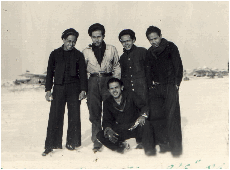
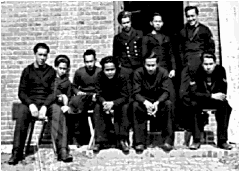
South Wales Jan.1946
Enjoying the sun, South Wales June 1946
Weeks passed and we eased into spring and summer.
The crew was augmented with several new ground crew members
and some new fresh pilots. I soon found out that these pilots were the same men
who came on board in 1942 as a class of midshipmen, and had their training
finished in England and their pilot training in Jackson, Mississippi USA, these
were all also half blood Dutch-Indonesian (in those days the term Indo-European
was getting very popular)
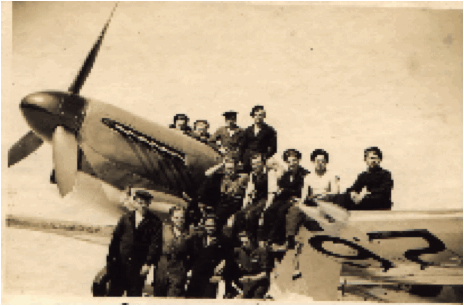
Taking a break... 861 Squadron, South Wales June 1946
Time passed and the squadron transferred to Holland in March, 1946 This was the second time in my life that I was in Holland. This was home coming to the Mother country. The squadron was stationed on “Valkenburg” a Dutch Naval Air station near the Hague, and I was now considered a war veteran eligible for an accumulated leave of ninety days. But there was no home town or home to come home to, so I went to an R&R Center in Doorn. The Center was run by the Navy and I met a lot of my old buddies there who were in the same situation as I was, no home no family. We were totally free and could come and go as we pleased. Meals were served at regular navy times, the only difference was that we had table cloths and place settings and you were served. I spent most of the day loafing around and stepping out at night. I had plenty of money, as I was paid retroactive combat pay and generally I blew it on booze and eating out. A group of us used to go out together and hit the town of Utrecht during week nights. We slept most of the day and around four o’clock started to prepare for another night on the town, skipping evening meal at the Center...!!! There was always a night spot that was lively.
One day my luck broke. It was one of those nights that I decided to go dancing before boozing, when I met a girl who was to become my wife. Her name is Willy Buys, and she lived in Utrecht.
It was love at first sight and I stayed until closing time. When we parted we made a date for the next evening and I went straight back to camp!!
The next evening she was there with her twin sister and I didn’t know who was who and asked her twin sister for a dance, but as soon as we hit the dance floor I knew I had the wrong one and said so too...!!
After that we kept steady dating and Willy took me home to introduce me to her Mother and the family.
Her Father had passed away, and I could get along with her
brothers pretty well also her younger sister and felt right at home. I spend
the coming weekends there when I was not on duty.


Willy Buys, Utrecht 1948
Utrecht, April 28,1948
My vacation ran out and so did my money, but I now had a girl, her name was Willy Buys. She took me to her home to meet the family, and from then on I led a serious life, no more booze and wild bar party’s. I went back to my base and spent the weekends when I was off duty at her house.
By now I had received a letter from home and my Father and Mother were out of prison and were safe with family in Jakarta.
I wrote them about my girl and told them that I was planning to marry her and they gave me their blessing, only regretted that they could not be at the wedding, but were sure that I soon would be home.
We were married on April 28,1948 in Utrecht.
I stopped drinking, and loved her, trusted her, and respected her to this day.
I was now six years from home, five of them without any contact with my family.
A new episode started in my life.
Indonesia was in turmoil in 1945 it proclaimed its independence with Soekarno as president. Rebel uprisings and freedom fighting raged the country and the Dutch had launched a police action in late 1947 but the fighting continued against the rebel forces of the self proclaimed president Soekarno.
September 1948, I was assigned to my old squadron in Soerabaja (the name was now changed to “Surabaia”) and with three other men I left by air for Jakarta and then on to Surabaia, to the old Naval Air Station “Morokrembangan.” I had come full circle after seven years. Three years after the end of WW II...!!!!
My wife was to follow me later by boat, and on September 21,1948 I left by commercial airplane (K.L.M.) from Schiphol, Amsterdam and landed in Jakarta September 25, 1948, and on September 28,1948 I was back from where I started, at the Naval Air station “Morokrembangan” in Surabaia. Seven years and one month after I signed up in 1941...!!!
A second police action was about to start, and I had a hard time to obtain a pass to go home to be reunited with my family
The Navy claimed that I had used all my active combat leave in
Holland and that for this year I had no more leave coming. Finally after
several requests, my division officer said that he would talk to the commander
in my favor and explain the whole situation. Three days later I had a pass for
two weeks leave and a train ticket round trip to Pasoeroean. I checked out a
weapon at the armory. That night I could hardly sleep and at four in the
morning I left camp.
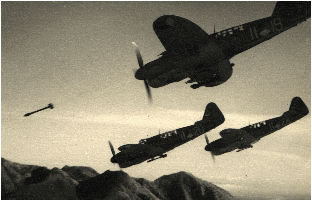
Firefly Mk 1- 860 Sqdr. Indonesia 2nd Police action - 1948
A jeep drove me to the railroad station and at five-thirty the train took off, crowded with hardly a space left. On every car were marine guards or army MP’s and I think that on the four hour journey my pass and ID must have been checked twenty times and my weekend bag searched.
At eleven I arrived in Pasoeroean and of course nobody was there
so I went into the station master's office and asked him how I could contact
the sugar plantation “Olean” at Situbondo. The man looked at me first because I
addressed him in Indonesian, but when he noticed my uniform hurried to the
phone and started to do some rapid dialing and shouting acts and in no time was
I connected with the plantation's switch board, and I asked them to contact my
parents and tell them that I was at the train station. After about five minutes
there was a phone call for me and it was one of the administrative employees
who spoke to me in Dutch and told me that my parents were under way and would
be there in fifteen minutes.The station master offered me a seat and a cup of
tea and asked me if I was going home and how long it had been since I was home.
He could not believe that I was gone for so long and that I had been all over
the world. Our chat was interrupted by a jeep pulling up and I saw my parents
in it....!!!
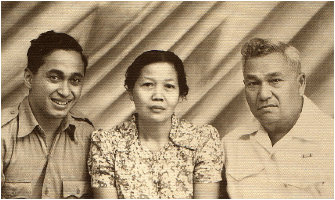
Home again...October 5,1948
I don’t remember what I said or did only that I embraced both of them and my parents kept saying “eindelijk, eindelijk...” what means “finally, finally...” My mother took my hand and didn’t let go even in the jeep. She hung onto me, told my father to sit in front, and I had to sit in the back with her still clutching my hand. When we arrived home she took me by the hand and led me in the house.
It was October 5,1948, two days before my parent's birthday, I was finally home after seven years and two months of separation. It was good to be home..! This was two months before my twenty-third, birthday. I had left before my sixteenth, birthday, four years after the war ended, and seven years of waiting and hoping to see my parents again, I was finally home..!
I told my parents that I was trying to get my wife to Indonesia and that she could come over if I signed a new contract for three years, my present contract had expired and I was on draft status.
In November 1948, my father had asked me if I could have a look at our house in Kamal, Madoera. The land was still his, but he had not been back there after the war. I asked one of my buddies if he would come with me. We took the ferry to Madoera, the same ferry I used to ride to go to school, even one of the deckhands was still there, and I started talking with him and he recognized me then. He told me also that several families were imprisoned by the Japanese and had never returned. He didn’t know what happened to the families of the friends I had and the old gang who use to ride the ferry back and forth. There where only a few who remained or returned after the war. All the rest was post war personnel, I did not know any of them.
When we came to our house, I was shocked by what I saw. The land was overgrown with weeds and wild vegetation, not one of the orange trees was alive. It was a mess and the house was totally stripped of wood and metal. It was terrible only the stone walls were standing up. The roof and every bit of metal and wood was stripped. The well was still there, but the metal structure that held the metal roof up was gone, so was the pulley. A young woman was drawing water out the well and when I told her who I was, she said that she remembered me and she pointed at the thatched hut were she lived and said that her mother was Boh Tigen, and that she remembered me too. I went with her to the hut and talked to her mother who immediately recognized me. She told me that during the occupation some Japanese officers moved in after my parents had left, and that they (the Japanese officers) had lived there for about two months and had moved out leaving everything behind and that later people from the neighboring hamlets had come and had helped themselves to everything what was left. But she assured me that not she or her late husband nor her son had anything to do with it......sure ! ! The young woman was her daughter Satima and was now married, I vaguely remembered her, she must have been about six years younger than I was. I went back to the house or what was left of it, and stood on the roofless veranda looking at the harbor of Soerabaja like I used to do before the war, and I felt a sudden rage come up in me, and it lingered for a few minutes and then subsided to make place for an indescribable wave of sadness. The woman, Boh Tigen, asked me if I could give her written permission to cut the brush for fire wood and I wrote her a “surat” letter of permission. My buddy and I went back to camp. What a horrible day it was. The hardest part was to let my parents know what I had found, and later I wished that I had never done it.
In June 1949 Willy arrived and my parents and I went to the harbor to welcome her. We were standing at the pier when the ship came in and moored and when the gangway was lowered I spotted Willy, and went aboard to get her...!!!
We were temporarily assigned to a hotel assigned to the Navy, awaiting allocation of a house. My parents stayed in a hotel down town and in the evening took us out for dinner...!!!!
The Navy assigned us navy housing, we had to share a big four bedroom house with three families. There were some alterations made and each had his own entrance and two families had to share a bathroom, and every family had their own kitchen.
It was an old colonial style house built long before the war with a nice big brick patio in front. We were very happy and started to enjoy life again.
By now the police action has stopped and things started to get a little easier. Slowly the squadron personnel started to rotate back to Holland.
We did a lot of entertaining for the guys who were away from home, and always had several fellows over for card games and dinner.
Willy became pregnant and on February 25, 1950, at 22:00 we
rushed her to the Navy Hospital in Soerabaja with an armed Marine escort, in
two jeeps ...! Our firstborn was born 5 minutes before midnight February 25,
1950.
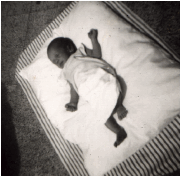

We named him Johannes Karel Ferdinand (John) Rugebregt.
We named him Johannes (John) Karel Ferdinand Rugebregt, after my Father. A healthy boy ...!!
Several times my parents would come over to visit and spoil us
with gifts, and they were so proud of their first grand child, which we named
after my Father..!
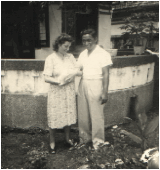
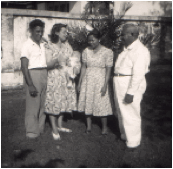
Moesie Straat, Surabaia -1950
The Squadron was officially transferred to the Netherlands and a limited crew stayed to pack all the material and made it ready for shipment to Valkenburg in the Netherlands. We had our last Squadron dance party officers and men with their spouses or girlfriends and lots of beers and tears and farewell speeches....!!
August 1950, Indonesia ceased to be a Dutch colony and was accepted as a sovereign nation. The Dutch flag came down in front of city hall and the Indonesian flag was raised. This was the end of a Dutch colonial era which had lasted for three hundred years.
The Dutch Military forces were put on inactive status and some units stayed only as military advisers. The rest was waiting transfer back to the Netherlands.
We were not allowed to carry weapons any more and did not felt too comfortable. All military institutions and bases were taken over and manned by Indonesian forces. Our big naval air station was also taken over but there were no Indonesian military to man it so we stayed and also all the civilian employees. There was not much to do as to maintain only the material what was to stay and handed over to the Indonesians All the squadron equipment was already shipped back to Valkenburg.
There was less to do each day, and we just stayed around waiting for our transport.
I was assigned to the big electronics shop, and just stayed
around doing nothing just visiting with the Indonesian civilian workers
chatting about days gone by and not wanting to mention the future. Some of
these people had worked for the Dutch government for 30 years, and don't know
what to do. During the Japanese occupation only a handful maintained their job,
but after the war they could return to work for the Navy again, but now there
was no future for them.
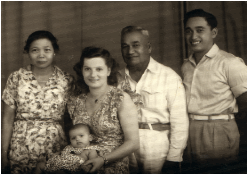
The last photo in Indonesia, August 1950
I was called to the commander's office and was told that I had two choices: One: I could stay in the Navy and return to Holland, or two: I could go over to the Indonesian National Navy and became “warga negara” or “changed Indonesian citizen”. This was because I was of mixed blood.(Indo-Europeans) All of us of mixed blood were told individually. The full blooded Indonesian personnel was if they so desired discharged upon arrival in Indonesia.
This was a political ploy from both sides. Indonesia looked at us who had served the Dutch military forces as pariahs and unwelcome traitors to Indonesia, but they could use our expertise. Holland was over populated, but owed us for fighting for her freedom as well, and could not cast us aside.
I felt like a son thrown out of the house and never to come back.......!!
I made my choice and have never regretted the decision. The love for my wife and child was stronger than the ties to my birthplace.
The Squadron crew was send home and only those who are married stayed and were transferred to the maintenance base awaiting transport home before the end of 1950.
We started to prepare for our return to the Netherlands and
started to sell most of our household goods on the black market, as people were
not allowed to buy from us so all the trading was done in the evenings and
mostly to Chinese merchants.
And so on September 13, 1950, we left Indonesia on board a troopship the “Sibajak” and sailed to Holland. It was to be a seven to eight weeks journey.
A chapter in my life came to an end, and I was to start a new one in a new homeland, but this time not alone. I had a strong wife to help and understand me, and a child son to cherish, and a new life lay ahead of us. I had plenty of time to think about it on our journey back to Holland on board of that troop transport and I did.
I had three more years to do in the navy because I signed that contract, and I traded palm trees and sunshine for snow and ice, but also a good wife and a strong son.
I only hoped that my parents could follow soon as they too were to make the same decision I was faced with, and so did thousands of people of mixed blood who had never seen Holland. They were not only service men but civilians too.I have found peace with myself...I did not have the desire to return to my birthplace and have not been back yet.
We arrived in Rotterdam in November 1950 and the weather was cold and wet. Here we were divided in groups according to the town of final destination and put on busses to start the long ride home from town to town. We ended up at the widow Everdina Buys, my mother-in-law’s house in Maarssen.
Johnny had a pretty bad cold and a high fever and the bus trip
was cold and miserable. Homecoming was subdued, but we were relieved to be out
of the misery. John had a touch of pneumonia, and we were pretty concerned for
the little fellow.
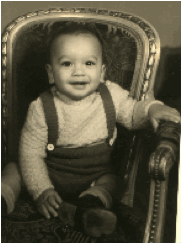
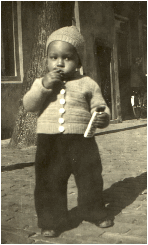
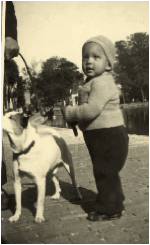
Johnny, Doorn 1952-10 months
Johnny, Maarssen - first steps 14 months - 1952
We stayed at my mother-in-law's house until we were transferred to a relocation center for repatriated families in Scherpenzeel until housing was found for us.
It was not the most desirable place, but what could we do? Holland was still struggling with the post war housing shortage and there were no houses available.
I traveled back and forth on weekends, and during the week I was at the Naval Air Station “Valkenburg” assigned to a training squadron with all old buddies from the tropics.
My interest in the Navy was gone, and I was looking forward to the 1st of May 1953, my release date. I did what I had to do, and that was it.
I went to the office of Social Services of the Navy and requested that I board with my mother-in-law.
It was granted, and my mother in law received payments, and food ration coupons for us from the navy and we moved in with her. By now the winter had set in and it was bitter cold, and it turned out to be the harshest winter in fifty years, folks said. We had a bedroom upstairs. It was unheated and every night John started crying after he was put to bed and slept for a while and we had to take him in between us. Then one morning we discovered what the reason was. John always kicked himself up against the head board and perspired, but it was so cold that his perspiration froze, and when he moved his hairs were frozen against the head board and pulled out. From then on the poor thing went to bed with a woolen nightcap and everything was OK!!
One day I received word that I was assigned a house just outside the Naval Base in Katwijk. It had two bed rooms and a living room and kitchen. It was actually a single family house with four bed rooms upstairs and living and dining room and kitchen downstairs but they had made a common porch from the hallway and put a door in the stairway and a door in the hall way leading down stairs, and put in a kitchen and bathroom upstairs, and there you have it... housing for two families. It was small, but we were happy with our house.
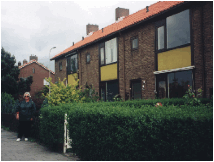
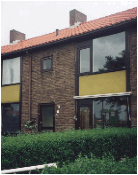
Our first house in Holland, Tulpstraat 4, Katwijk 1951
It was more than many a family could wish for, and had to be on a waiting list for at least two years. There was a severe housing shortage after years of German occupation
Things in Indonesia were not getting better and I received word that some “Freedom fighters” had tried to assassinate my father and shot him with a stengun in the hip and afterwards ran in to the sugar fields. What bravery to ambush a 70 year old unarmed man on the way to his work...!!!!
My father took four bullets lucky none fatal, but he lost a lot of blood and was transported to a hospital. The next evening he had a visitor, a well dressed Indonesian asking him what happened, and when my father explained to him what the situation was, he turned around and said: “To bad next time better..” and left. That same night before the night shift came in he was moved to a different room..!!
The next day he made arrangements to be repatriated with high
priority, and soon they were underway to Holland. My parents arrived from
Indonesia in August 1952 and settled down in the Hague not too far from where
we lived. The family was once again together.

My Father and Mother in Holland 1952
I was again transferred from the Maintenance Base to a new squadron, Squadron 4, and we started our training routine, with new pilots and ground crew. I didn’t mind that much as I was living of the base, and could go home every day.
On September 10, 1951, 07:00 AM our daughter was born, and we named her Maureen, Louise...!!
We had now what they call in Holland a”Kings wish”, a boy and
a daughter..! I felt proud and lucky.
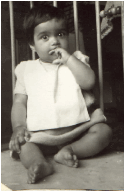

Maureen 6 months 1952 - Johnny and Maureen 1952
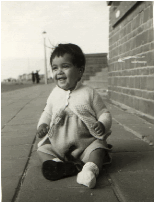
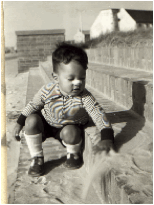
Maureen and Johnny, Katwijk, 1952
It did not go so good at first.Willy was breast feeding but didn’t gave enough, and Maureen was not strong enough to get more and slipped slowly into malnutrition and dehydration and couldn’t even muster the strength to cry. It was not noticed until the doctor came by for his routine house visit, and immediately put Maureen on a rice water diet for a couple of days and them on a very expensive nutritious formula.
To make things worse our squadron was now transferred to the aircraft carrier Hr.Ms.“Karel Doorman” for training and we sailed off to the West Indies and once again I was at Curaćao. We alternated landing practices on land and on the flight deck, and the ground crews shuttled between flight deck a week and air field the other week.
Contrary to 1943, I hardly went ashore just a couple of times. Willemstad was a duty free port and I bought a gold watch for Willy and some toys for the children. I mostly stayed on board saving my money.
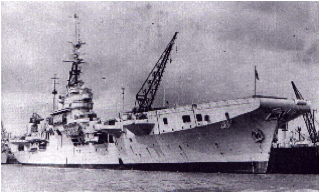
Hr.Ms. “KAREL DOORMAN” - Rotterdam 1952
We stayed in the West Indies for 2 months and I was wandering and concerned about Maureen's health.
Finally after wrapping up our training session we sailed back home to Rotterdam.
We returned to Rotterdam in April 1952, and I high tailed it home. When I stepped in the hallway a very shy little boy greeted me and was a little uncertain who I was, but soon got over it. I went upstairs and there, of-course, was my wife. She took me to the bedroom were the crib was with Maureen sound asleep. We looked in the crib where my daughter lay sleeping, and soon she woke up and Willy brought her in the living room. What a difference it was..! When I left she was a very sick tiny girl, and now she was a living doll, healthy and smiling. We stayed in port a few weeks and then took off again on maneuvers with NATO and finally returned to the Naval Air base.
I transferred to the base maintenance group and was sent to training again, this time for “Link” trainer (forerunner of the flight simulators today) technician and radar school. Again away from home and only home on the weekends.
1953 arrived and again I was transferred to an active squadron that was getting ready to go on board the carrier and I was hoping that they would not be ready until after May. As it would turn out, I was transferred back to the maintenance base again and got an assignment in the battery shop. I knew then that this was my last assignment, as usually they assigned you to a soft unimportant job when your release date was near. I was called into the divisional officer's office and asked if I would reenlist for three years!
“No thank you ....Sir” My papers for discharge were processed and the discharge date was: May 1st 1953, “or as long as the Secretary of the Navy deemed necessary.........”
I had to wait until orders came to be transferred to the recruiting center from were I was to be discharged. It could take days or even months.
In April 1953, I received word that I was to report to Naval station “Kattenburg” in Amsterdam on May 1st, 1953 for discharge procedures.
On April 29. two days before my discharge I had to serve on a burying detail for a pilot who crashed in the North Sea and rescue crews were not able to save him before he died from hypothermia and drowning. I didn’t have a dress blue jacket any more, or rather one which was pretty threadbare so I had to scramble to borrow a decent one from one of my buddies who was to stay in the Navy.
The next day I checked out for the last time and went off to the recruiting station in Amsterdam. I stayed there one night and the next day received my discharge papers and my last pay, and a train ticket and I left the Navy for good.
The date of my discharge was May 1,1953. A honorable discharge after eleven years and three months of service, and with decorations for combat at sea, and combat duty during the second police action in Indonesia.
I was once again a civilian...!!
~~~~~~~
I started a job with KLM - Royal Dutch Airlines at Schiphol Airport and plunged into civilian life. After a couple of months I requested housing in Amsterdam so that I did not have to commute every day from Katwijk to Schiphol airport and because I had to vacate my Navy housing and didn’t have a place to go. KLM’s division of social services and the city of Amsterdam’s social services got together and I was granted first priority as a discharged service man and veteran and pretty soon we were allocated a house on one of the canals in Amsterdam. We were in seventh heaven a full house of our own although we had to rent it from the city. At that time nobody could afford a home of their own, there were simply not enough houses and all the housing was controlled by local governments so that everybody could get a house as close to his work as soon, and as fair as possible. Sure there were always places you could rent on the black market, but those were outrageously high in rent and if it was discovered, there was a stiff fine for the landlord and you were evicted.
It was an older three storied building in the older part of
Amsterdam and on the first floor, on one of the many canals, on the
Bilderdijkkade. Four bedrooms and a living room, and a kitchen and bathroom on
the first floor. (First balcony on the photo.)
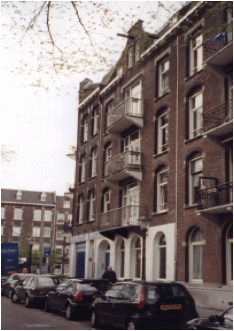
Bilderdijkkade, Amsterdam
To us, it was a palace. It was in this house that our youngest
son was born on December 19, at 11:45 PM.1955. We named him Rudy Ferdinand. He
was a quiet and happy baby, and the whole family was happy with the new baby.
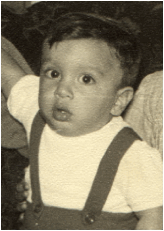
Rudy 6 months - Amsterdam 1956
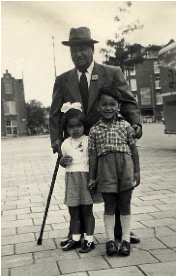
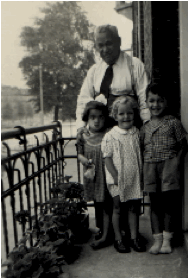
Opa, Johnny, Maureen - 1956 Amsterdam,
Bilderdijkkade - 1956
It was also here that Willy got terribly sick. One night, when I came home from the evening shift I heard Willy calling from the bed room. She was in bed and told me that she could not move and she hurt. Johnny was laying next to her fully dressed and Maureen was in her crib also dressed. Willy told me that Johnny had helped her take her dress off and covered her up in bed, and then went to sleep next to her and that she could not move at all. I took care of the children, called the doctor, and took care of Willy. She was totally paralyzed. The doctor said that it was some kind of a nerve disorder, but it could get better.
Thanks to social services of KLM, was I able to get full time nursing help at home and could go on day shift until Willy was fully recovered. Johnny went to Dien Augustinus an older sister of Willy in Maarssen, and Rudy, who was only an infant, went to Flip and Bets Hogerhout, a cousin in Amsterdam not too far from were we lived. Only Maureen stayed home to keep her mother company, and for a short time our family was separated but we managed. It would last nine weeks. Slowly Willy got control back over her limbs and the rest of her body. The doctor said it might be a result of all the stress we encountered in Indonesia. Her nerve system seemed to have been effected by it. Willy recuperated fully, after nine weeks with no known side effects and we were all thankful for it.
Shortly after Willy recuperated we moved once more to the outskirts of Amsterdam to a village named Halfweg (Halfway), first to an older house and later to a brand new flat on the second floor.The children were growing up and John and Maureen went to grade school, and we were happy.
Christmas 1957, I received a Christmas card from my friend Ben Portier. He was in California and he wrote me a letter, encouraging me to try to immigrate to the United States. Congress had passed a bill (PL 85-316) extending the quota for “displaced persons” from Indonesia to immigrate and obtain a work permit in the U.S.
• March 6, 1958 I applied for an immigration permit.
• April 25,1958 we went to the American Consulate.
• April 28, 1958 received our quota numbers.
• May 28,1958 Our sponsor was the World Service of Churches.
• June 5,1958 We were interviewed for visa preparation. Screening for police records and communist activities, etc.
• June 25, 1958 All papers were submitted for processing.
• August 18, Received notification that a sponsor was confirmed.
• August 25, Notified to have a medical exam for the whole family at the American Consulate
• September 22, 1958. After a medical exam we were issued a visa number and I had to sign an affidavit that as head of the family, we would not be a burden to the state and federal government and would have to be self supporting for the first five years.
Now a waiting period started. Everything was taken care of and I had notified KLM that I was to quit whenever I received notice of departure. I could stay with KLM until October 31,1958. They gave me a farewell party the family was invited too, and presented me with a KLM model of a DC&7C and a book about color photography, and Willy a big bouquet of flowers, and a ticket one way to New York for the whole family...!! Our departure date was Tuesday, November 11, 1958.
The day before we left we went to my mother-in-law's house for
the last time and when we walked back to Willy’s sisters home where we stayed
the last night, Rudy started to cry and said:..”Now we don’t have a home
anymore....”
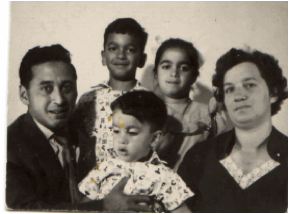
The last photograph taken in Halfweg, the Netherlands
November 1958
I just picked him up and told him we are going to have another home, and he stopped crying....
We already had said goodbye to my parents, and the next day we
left for Schiphol Airport. Willy’s family was at the airport to say goodbye,
and we boarded KLM flight KL 633 at
Schiphol Airport in Amsterdam, and set off for a new life in the United States
of America...
~~~~~~~~
Tuesday. November 11,1958 7:00 PM
It was a cold and drizzly evening when KLM flight 633 touched down at La Guardia International Airport with me and my family on board.
I had obtained a visa and a work permit for permanent residency in the United States of America. We had a sponsor from the World Church Services organization and we were about to start a new life. I had with me, my wife Willy, our oldest son John age 8, our daughter Maureen age 6, and our youngest son Rudy age 2.
After going through customs I looked around to see if I could spot somebody who was to meet us from the sponsoring organization, not seeing anybody I turned to the customer representative of KLM to see if he could offer some help. The man was very helpful and after making a few phone calls told us to wait a while as the lady who was to meet us left because the flight was an hour delayed and she went to get something to eat. She returned after a short while and addressed us in Dutch, which was real nice for Willy and the children as they did not spoke English. She did introduce herself, but I am sorry to say that I did not remember her name maybe it was because I was too tired after a thirteen hour flight. We were told that we were sponsored by the Women's Club of the St. John Episcopal Church in Chula Vista, and that she would get us on the train to San Diego, where Father Nale, the minister of the church would meet us and take us to Chula Vista. At first I had no idea were Chula Vista was, but after the lady had mentioned San Diego I realized that we were going to California. It couldn’t be better, as I always had hoped that for its climate we would end up in California, and my buddy Ben Portier was there.
We all went in the bus to New York City and got out at Rockefeller Plaza were we were to wait while the lady was going to arrange for our train tickets. We had about an hour time and we decided to have a walk around the block and marveled at all the tall buildings around us. It was evening and all the lights were on and we saw people ice skating outdoors and there was music playing and every body seemed happy. We found a restaurant and had our first dinner in America!! I had been here before, during the war in 1942 and fond memories came back of the good times I had spent there while on shore leave, but that was passed and now I was back with a family of my own to take care of, and ready to start a new life.
After we got back, the lady returned with our train tickets and she explained to me how we had to travel, and that in San Diego father Nale would meet us at the train, and she had sent a telegram notifying him of the time of our arrival. She took us all to Pennsylvania station and helped us on the Erie train to Chicago. There we had to transfer to the Santa Fe train to Los Angeles and then transfer to the Southern Pacific train for San Diego were we should arrive Saturday, November 15 at five in the afternoon. After I thanked her for all the help, we said good bye and she wished us luck. I only wish now that I could have remembered her name.
We settled down and found nice seats together and soon were on our way, what was to be a three day journey across the United states. Although I was dead tired and suffering from jet lag, I was too excited to fall asleep, and I spent most of the night wondering what lay ahead of us and hoping that I could get a job soon to support my family. Soon we all were asleep.
We arrived in Chicago around six in the evening the next day and here we had to change trains. We got off the train and there was a man by the exit gate wearing a sign “Immigration group 2 for Santa Fe to Los Angeles” I went to the man and he asked me how many in the party and said to follow him and not to worry about the baggage. We followed him to a waiting area outside the station and told us to wait there until he came back to get us on the train to Los Angeles in about an hour. We had something to drink and a piece of pie and I went to buy some apples with John. I had no idea how many pounds we needed, so the man asked how many people and I said five, and he started to put apples in a bag and handed it to me. When I wanted to pay for it he asked if I was an immigrant and when I replied “yes” he said “No pay... welcome to America...” I was overwhelmed and did not know what to say just “Thank you...” and shook his hand and he gave John a pat on the head, turned around and started to help other customers.
We boarded the Santa Fe train to Los Angeles and were soon on our way to the west coast, and we prepared for the night. We had three more days to travel. We managed to sit somewhat together Willy sat with Maureen, I sat with Rudy and John sat two seats forward next to another little boy. The next morning John and Maureen started to play with the little boy and his sister and although they couldn't speak English, they seemed to get along pretty well and the whole journey to Los Angeles they played together, and every once in a while Rudy would go there and sit down to watch them, but mostly played on the seat next to me or Willy. I mostly looked out of the window at the scenery, which was so different from Holland. In Holland everything was green and flat and you always passed through a village or town. It was at the most half an hour between stations, while here the landscape was so different; for hours there was nothing but rugged country, hills and mountains, and at some places nothing but grass land as far as the eye could see. Although I had been in America in 1942 and 1943 when I was in the navy during world war II, this I would have never dreamed. All I had seen of America were big cities and the harbors, and again I was awe struck by the big open spaces of this country, and in a way it was a little frightening, this was to be our new home and country. Once I saw a man on horseback riding along a fence and I said to John: “...look a cowboy....”. I had no idea where we were and just waited as we chugged along.
I met a man and his wife on the train who were heading to Oakland, California, and when he found out that we were immigrants on our way to Chula Vista, he told me a lot about California and life in general. He was born in Chicago out of Italian immigrant parents, and he had moved to California and just returned from a visit to his family in Chicago. He asked me if I had a job and what kind of work I did, and said not to worry as there were good jobs in California if you were willing to work. He himself was in the produce business. He also told me how I had to transfer to the Southern Pacific train for San Diego, and that Chula Vista was a little town near the Mexican border. He too, said not to worry about the baggage as that would be all taken care of.
After three days, we arrived in Los Angeles and the conductor made sure to point out to me how to go about finding the Southern Pacific train. I must admit that everybody was real helpful and friendly to us and we did not encounter any difficulties. The temperature in Los Angeles was pretty warm, and we were all bushed from three days of travel. We were used to Holland's fall weather, and here it was like summer in Holland.
We boarded the train to San Diego and again found seats together. There were very few passengers on the train and the ride was so different again from what we had seen the last three days. Lots of orange groves and fields with vegetables and farms, but again those wide open spaces but this time there were more little towns and once in a while we saw beaches and the Pacific ocean.
On November 15,1958, we arrived in San Diego around four thirty in the afternoon, and my first impression was so different from what I had expected, no huge station as in Chicago and New York, but just an open air platform and no hustle and bustle everybody so relaxed, and nobody in a hurry.
I spotted Father Nale as he came walking up to us and said: “Do you speak English, and are you the family from Holland?” I said “Yes” and we shook hands and I introduced him to the rest of the family. He said: “Welcome to America...good luck and God bless.” He took us to the car and said that Chula Vista was about half an hour drive from the station. We talked on our way to Chula Vista and Father Nale told me that the Women’s group from St.John's Episcopal church had sponsored us and that it didn’t matter whether we were Episcopalian or not, and when we passed a Presbyterian church said that most likely we would go to this church, but that was of later worry.
The house the church had rented for us was on a dairy farm, but it was not ready yet, and we were temporarily to stay in a motel maybe for one or two nights to rest up and the next day, Sunday, after church maybe some volunteers would help us clean the house and move in. Don’t worry about the costs as the church would pay for it, and we can worry about it later. Father Nale dropped us off at the motel and after he arranged for us to have a family unit, left us after a promise that he would send somebody to pick us up for church service Sunday, the next day, if we wanted to, around nine o’clock in the morning, to meet the people who sponsored us.
The motel was a nice family style motel and we had two rooms with a kitchenette, and they had brought in two extra beds. For the first time in four days, we would sleep in a decent bed!!
In the evening I took a walk with John just up and down the street and looked into a window of a grocery store and I couldn't believe my eyes, the prices were so inexpensive. For instance, 29 cts. for a dozen eggs, in Holland we had to pay 29 cts. for one egg, and the meat prices!! I thought that if I could earn as much in dollars as I had earned in Holland in guilder's, that I would be OK, and my only worry now was to get a job.
Here I was at my final destination with a wife and three children, two suitcases with all my belongings and about sixty-seven dollars to my name...!!
For a fleeting moment it was a frightening thought and an awesome responsibility, but I shook it off and had faith in the future, as long as I could get a job. I was a trained aircraft maintenance technician with ten years experience with an airline and the Naval Air Force, and could also work as a journeyman electrician. I was ready to tackle any job for a start, no matter what I had to do.
The next day a gentleman by the name of John Gillis dropped by to take me to church, and I decided that I would take John and Maureen with me and leave Rudy home with Willy who was still tired from the journey. After I introduced John to the family he told me that he was also an immigrant from England by way of Canada, and it would turn out, we were to become real good friends and they were a big help in getting us settled. His wife, Dorothy, called Willy almost every day on the phone to help her with the language and to help her get acquainted with the ways and customs of our new homeland. They had two children, the oldest a boy named Tommy and a younger girl named Joyce and they got along real good with our children although several years older.
After the church service I was introduced to several members of the congregation who stayed for coffee and cookies. That day I met many nice people who were all eager to help us get settled and several donated all kinds of things to us. There was a bed here and a sofa there and all kinds of household items which we of course could use very well. We picked up Willy and Rudy to have a look at the house. The house was cleaned and soon it was also furnished, very basic but the furnishings were all in very good shape. We even had a gas stove and a refrigerator. It was all so wonderful and we were thankful to all these nice people. We stayed two more nights in the motel and there after moved into the house on November 18,1958.
Our first house in America, on De Jong’s dairy in Sweet water Valley Chula Vista, California.
It was his milkers house, who had moved to the city, and we rented it, for $100.- a month.
The dairy man came over to meet us. He was a first generation Dutch man born in America from Dutch immigrant parents. His parents came from Friesland the most northern province of the Netherlands, and his wife's family was also just immigrated from Holland and they both spoke Dutch, which was a very nice surprise for us. They too were very nice people, and the man told me right away not to worry about the rent, as the first month was taken care of by the church, and that I first must see to it that my children were fed!! They had four sons, two teenagers, and the two youngest ones were a year older and a year younger than our John. It all worked out nicely and we were very happy. Later on Willy would refer to this time as the happiest time in America, when we lived in the “green house”. The house was painted light green with a white trim.
Sunday we all went to church, and after the service we stayed and met with all the members of the Woman’s club who had sponsored us. It was a real good feeling to know that so many people were willing to help us. Everybody we met offered to help us and did so in one way or the other. Later in the afternoon Father Nale drove up in his jeep and called on me to help him unload some boxes. The kitchen floor was covered with boxes all filled with food and we had two big frozen turkeys for Thanksgiving. We were again overwhelmed by the generosity of the people and thankful for all the goodness that came our way. We didn’t know the meaning of Thanksgiving, as we did not have that holiday in Holland.
John Gillis had some good news for me. He had talked to the supervisor of maintenance at Pacific Southwest Airlines (PSA) and he would take me with him to work for an interview, and he sounded very encouraging, and told me that PSA was planning to buy new aircraft and that they were looking for an experienced electrical technician to start a maintenance program for the Lockheed Electra’s that they were planning to buy. It sounded all so good and I was exited that I was so lucky to get a job so soon. That Sunday night I went with John Gillis to his work for an interview.
I had a talk with the superintendent, and he asked me all kinds of questions about my past experience, and how many years I had worked for KLM the Dutch airline, and what kind of airplanes I had worked on, and he gave me a work application to fill out and told me that most likely they would hire me but I could not start until December 1, and he would let me know. It was John's regular shift, so I had to stay the whole night as I did not have a way to get home, and I took the opportunity to look around the facility to get an impression of what was waiting for me, and meet some of my future co-workers. I was surprised at what I saw. There were two old airplanes, DC-4’s, in the hangar and a few people working on them, that was half of the PSA fleet and the whole maintenance crew. After midnight a few more part-time workers came in, it was the night shift crew from Convair Aeronautics across the runway. That was it, and I was a little disappointed, as I was used to a modern world class airline with all the modern facilities, after all KLM is the oldest commercial airline in the world, and at that time the world's third largest, with a fleet of forty American built aircraft, but who cared, I had a job and it was kind of challenging to start a new maintenance program. When I got home the next morning and told Willy about the good news we were glad that we had something to look forward to. It was only ten days to December 1, 1985.
Father Nale came by the next day and told me that he had a little job for me at the church school. The school needed some book shelves made in the new library and some telephone and intercom wiring had to be installed to all the classrooms. I had a talk with him and told him that I could not pay for all the expenses like the motel costs and the house rent, but that I was going to pay him back as soon as I got paid from my first job, and I told him of the job possibility at PSA. He said not to worry about it and that the Women’s club would take care of it until I was able to fend on my own. Anyway, I went to work for the church and did all kinds of odd jobs, janitorial work as well. At the end of the second day, Father Nale gave me a check for fifty dollars to tie me over as he said. My first paycheck in America.
Among the people I met was a young bachelor named Jan van Beem, also an immigrant from Dutch-Indonesian descent and he too was very helpful to us during the time that we were getting adjusted to American life. Jan had a car and taught me how to drive in America, and he drove us to do grocery shopping, and to get my social security number and card etc.
John and Maureen went to Rosebank school just down the block with the two youngest boys from the dairy man, and for the first four weeks were put together in the first grade to learn the language. It worked out well and soon they were able to go to their own classes. John loved the dairy and he could help the boys with their chores, and ride an old horse that was put to pasture. I loved to see the three boys ride the old nag, it was so good to see that the children adapted so well. At the far end of the pasture was a golf course water trap, and the three boys would go down there and retrieve balls from the water, take them home to clean them and on the weekend sold them at the gate of the golf course for a couple of pennies and got some pocket money. Maureen did not have a girlfriend on the dairy and stayed mostly home with Willy and played with Rudy, but they seemed just as happy.
I started to work for PSA on December 1,1958 and drove to work with John Gillis. I must admit that the first night at work was kind of shocking, I was used to a well organized smooth running operation at KLM, and here was a maintenance unit that was supposedly their main base that was run like a circus comedy act, nothing was organized and if you needed a part you had to hunt for it in a store room the equivalent to a junkyard. The electric shop was a plywood shack in the corner of the hangar about ten by fourteen feet with electrical power piped in from two sockets on the hangar wall fed into three outlets inside the shack. There were two Volt-Ohm meters and a Wheatstone’s bridge meter to my disposal. That was all the test equipment. I had a few special hand tools to service aircraft electrical wiring systems, a cabinet with all kinds of worthless telephone junk and lots of rolls of electrical wire, and a few books with schematics of the Douglas DC-4 systems. Outside the shack was the battery charging and maintenance area consisting of two automotive battery charges two ten gallon jugs with sulfuric acid and a couple of jugs with distilled water and a fifty pound container of soda. Since we did only between flight and light maintenance to the aircraft, I could get by with this, but just barely. There were ten full time employees on night shift, and for the rest they relied on part time workers from Convair Aeronautics across the field, and an older man who worked for the telephone company during the day and as a part time electrician for PSA during night shift. Malfunctioning or unserviceable components were simply sent to a certified repair station on an exchange basis. After a while I got used to it and it was actually a very simple operation, four ancient airplanes and just a flight maintenance crew. After first break the supervisor retreated to his office on the mezzanine floor of the hangar and we would not see him until six in the morning. Rumor had it that he was an alcoholic and drank in his office and left the running of the crew to a lead mechanic.
My salary was $201.- a month and that included night shift compensation, but that was all-right to start with. I was glad I had a job, and the pay didn’t seem to be that bad, I had to start from the bottom.
The first pay day in December I did not get paid, as I had not worked a full month. On the way home in the car John handed me an envelope and said that the guys at work had taken up a collection to tie me over for the holidays. There was $50.- in the envelope. It was a nice gesture of the guys I worked with, and I appreciated it very much, and the money was very welcome. Rudy had his third birthday and we were able to buy him a small present it was a pull toy in the form of a chicken and when you pulled it across the floor it made a cackling noise and it drove us crazy but he was happy with it.
We were invited to a Christmas party at the Foreign legion hall, and the children were treated to candy and toys and they had a Christmas play.
At home we had our first Christmas in the United States and I don’t think that I ever felt so peaceful and happy in my life. We had a little Christmas tree and made cardboard stars and colored them or wrapped them in tinfoil. We still look back to it as the most beautiful and happy Christmas we had, Christmas 1958!
New year came and I felt confident that things would work out well for us. I had a job and the children were settled at school and everything was going well and Willy and I were talking about paying back the church every month as much as we could afford and start paying our own rent.
Jan Van Beem took me out every morning for drivers training until I got my driver's license and drove us to the store every time we needed to do grocery shopping.
Time moved on and we were now about four months in the United States and started to adjust nicely. Ben Portier dropped by one day from Los Angeles and we were talking jobs and when he found out what I earned at PSA, he suggested that I try another airline as they were the only good paying jobs in the aeronautical industry that did not require citizenship. I decided to wait for a while before I made such a move. Through friends Willy got a job cleaning houses to help augment our income and I silently admired her for her courage to go to work without even speaking the language. It is her strength and love that kept the family bond strong and helped me to succeed through the years.
I still didn’t have a car, and one day Jan and I set out to go car shopping as I realized that I could not and would not depend forever on friends to drive us around although I did my share of hiking and biking around also.
After visiting a few car dealers in San Diego and discussing several cars among us, one salesman approached us and asked what language we were speaking it was not Spanish although my dark complexion made him believe at first that I was Mexican. We laughed it off and told him that we were Dutch and he looked at us like I was pulling his leg but after I explained to him that I was originally from Indonesia which used to be a Dutch colony and that I just recently immigrated and was looking for a good used car he understood. He then offered me a private deal. He had a good car at home. It was a 1949 Oldsmobile Rocket 99, and the engine was in good condition and the car well taken care of. We followed him to his house and looked at the car and it was in really good shape There were no dents in the body and the engine looked real clean and sounded good. I was satisfied and we came to a deal of $300.-, which was as much as I could afford for a loan. The man took me to a savings and loan company and helped arrange for a loan for me as I did not have any credit reference and I believe that he even signed for the first year security. As I drove the car home Rudy kept asking me: “Is this our car now......!!” But before I got home I got a ticket for an illegal left turn and when the policeman saw that I had only a temporary license and a green card he just shook his head but gave me a ticket anyway and so I got home with a car and a ticket. Willy could not believe that this was now our car. It was so big and such a nice car. The color was dark green with lots of chrome trim and the inside was like new. The man who owned it before didn’t have children and hardly anybody sat in the back. We all hopped in and took a short ride and that night I drove the car into work and from then on John Gillis and I car pooled and took turns a week at a time driving to work.
By now I worked more than three months at PSA and I figured that my probation time was over and expected a pay raise as I was promised, and waited to see if it would show on my paycheck. I had found out that I was earning a dollar more than the janitor on day shift and I thought that it was not fair. The junior mechanic on my shift earned $100.- more than I did and he was hired two months before me at the same wages but his first pay raise after probation was $100.-. The superintendent came over to talk to me and soon the matter of my pay came up and I asked him when would I get my pay raise since I was now past probation. He said that that was just what he wanted to talk about and wanted to know if I was willing to stay with the company. He said that if he was certain that I would stay, I would be sent to maintenance school for the new Lockheed Electra’s that PSA was going to buy, and that I was to get a substantial pay increase when I successfully finished my schooling. I thought “well what the heck, I’ll try again” and agreed to go to school and get my tickets This would be beneficial to me anyway as my Dutch certificates were not recognized by the FAA.
The next Sunday afternoon I set off for Burbank with three other mechanics.We stayed in a motel as was arranged by the company and the next day a mini bus from Lockheed training center took us to the plant and we checked in for classes. The courses were for maintenance and repair for the electrical, auto pilot, heating and air-conditioning, radio radar, and hydraulic systems and test equipment and lasted seven weeks.
When I got back to work I started to work on a rough draft for a maintenance plan and schedule and made a listing of what test equipment we should buy to get by with at the least cost. The DC-4’s we had were old prop planes and the Electra was a prop-jet airplane five generations ahead and entirely different as far as technology and maintenance was concerned. It was going to be an expensive and complicated plan.
I never saw the pay increase I was promised and was getting pretty disgusted with the way they broke their promise so I decided to apply for a job with United Airlines. In the meantime I kept doing my work and didn’t complain or say anything to John Gillis or any body else.
There came an answer from United Airlines inviting me to come to the Los Angeles personnel office for an interview and testing. After work the next morning I hopped a flight to Los Angeles and had an interview and some tests. After I filled out some more paper work I was told that my chances to be hired were very good and that in two weeks I would receive a letter from the San Francisco maintenance base whether I was hired or not and to have my medical examination in San Francisco.
After two weeks I received a letter from San Francisco for another job skill interview and medical exam. Again I hopped a flight to San Francisco and this time went to United’s maintenance base. The second interview and the medical exam were favorable and I was sent to the manager of the electronics division Mr. Dwayne Gordon.
The manager was very nice and asked me about my present job and past experience and after I told him about my experience with KLM and the naval air force he asked me why I would leave PSA and so I told him that the pay was bad and about the promise they broke. And when he heard what I was paid at PSA,he said “Well, you'll be making more here about twice as much if that is OK with you.” Needless to say that it was very much OK with me. He said that as far as he was concerned a further interview was not necessary and he picked up the phone called the personnel office and said that he would hire me and then said to me..: “Come on let me buy you lunch!!” I had lunch with him in the main cafeteria and after lunch I went back to the personnel office to finish off some more paper work. I was told that within a week I would receive a letter telling me when I could start and most likely I would be given about two to three weeks time to quit my other job. When I got home I had only three hours to sleep after dinner before I had to go back to work but that was OK as I felt a lot better with the prospect of a better paying job ahead. I spent some anxious time waiting for United’s job conformation but after five days I received the letter. It said that I could start on Monday, September 29,1959 and that my starting wage would be $2.05 an hour and I roughly calculated that I would earn $300.- a month, that was about $100.- more than what I made at PSA. Willy and I were elated with the good news and started to talk how we would make the move.
That night it was John’s turn to drive and on the way into work I broke the news to him and told him why I quit, and why I didn’t talked about it before. He was very understanding and could not understand why I was never given a pay raise after probation and didn’t blame me for leaving.
At work I told the superintendent that I was quitting the company and gave him two weeks notice if need be. He was quite upset and told me that the company had just invested all that money in my training and now I quit, while he was just about to put me in for another ten dollar a month raise. I said thanks but no thanks, United Airlines offered me a $100.- raise as a starter, with a pay raise of 5 cts. an hour after 90 days probation. It was all on paper and I could start the 29, of September. After that he just stormed out of the room and didn’t speak to me any more for the remaining time that I was there. The word got out after I also told Dave the lead-man, but my fellow workers were very sympathetic and said they would have done the same thing if it was to happen to them. That was the end of my career with PSA.
I started to make preparations now for the move, and talked to Father Nale about paying the church back every month and made arrangements with Corny DeJong about the rent and so on. Corny offered to help financially which I gladly accepted. Floyd Riggs advised me on driving to San Francisco and that I could sleep in the car on gas stations parking lots, and save some motel costs. He had done it too when he moved from Tennessee to California. The days flew by and on Friday morning I said good bye to all my fellow workers and collected my last and final paycheck from PSA. It was September 26, 1959.
The next day after lunch I threw a suitcase and a blanket in the trunk and drove off to San Francisco. Before I left Chula Vista I stopped by John Gillis’ parents to say goodbye to the old folks of which we were very fond and grew very attached to.
When I was ready to leave, Grandpa Gillis got up and said: ”Well lad, lets go, you can give me a ride to Frisco and after you have shown me the Golden Gate bridge, I will take the Greyhound bus back to Chula Vista” He got up walked into the bathroom, pocketed a toothbrush and his razor, asked his wife for a clean “hanky” and said he was ready to go. I didn’t know what to say. On one hand I was glad for the company, but on the other hand I worried about the extra cost for a motel as I was planning on sleeping in the car to save money. Well never mind, we worry about that when we get to it, and we took off to San Francisco over highway 101.
Grandpa Gillis insisted to pay for the gas and a motel and our overnight stop was in Santa Margarita just outside San Luis Obispo. We arrived in South San Francisco around noon Sunday and I soon found a boarding house near the Maintenance base for $30.- a week with use of kitchen and clean sheets every week. After I unloaded my baggage, I took Grandpa Gillis to the Golden gate bridge and drove across the bridge to Marin County and stopped at the park there and enjoyed the scenery of San Francisco’s skyline. It was a beautiful clear day and warm for September. After a while we got back in the car and I drove Grandpa Gillis to the Greyhound bus depot were he bought a ticket to Chula Vista and after he made a phone call to John Gillis, we said goodbye and he got in the bus and was on his way back.
What a grand old man, this was his way of helping me getting started, and rather than offering me the money and maybe embarrass me, he went along for the ride while paying for gas and lodging.... “Thank you Grandpa Gillis!”
The next day September 29,1959, I started my career with United Airlines, which as it turned out, would last for twenty-six years and four months.
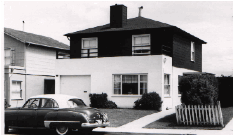
15 San Felipe Ave. South San Francisco - Summer 1960
I found a rental house in Daily City, a suburb of San Francisco, and about four miles from work for $100.- a month, and made plans to have the family come over.
United gave me a free pass for Willy and the three children and they flew over and the family was together once again.
We stayed in this house for six months and then moved to South San Francisco which was four miles closer to my work. We rented a four bedroom house with a front and back yard.
I passed my probation time with United Airlines and had no intentions to change jobs ever. I worked in the electric shop and I enjoyed my work. The job was great with good benefits. United was just about to get its first DC-8 jet liners. It was a far cry from PSA’s operation, although I had to be grateful in a way as it was the first outfit that hired me, in spite of the fact that they may have tried to take advantage of a green immigrant. At that time United Airlines was the world’s largest airline, although a domestic carrier only, it had the largest fleet in the free world, and it was not government owned. The pay was good, but there were so many things that we still needed and we had to pay back the church and Corny DeJong for he paid for the movers.
One day we had only one dollar left for gas and payday was a week away. Willy said she was going to look for work to augment our income, so we got in the car and drove to Pacific Heights in San Francisco, an upper class neighborhood and rang a doorbell, and when the lady answered the door I explained to her that Willy was looking for work but could not speak the language yet and that we were newly immigrated from Holland, and that Willy was willing to do housecleaning work. The lady said that she herself did not need any help but that the lady in the apartment around the corner owned the beauty salon across the street, she may could use help. We went to the neighbor and this lady could use Willy’s services and she could start tomorrow. The next day I drove Willy to her work and when I picked her up that afternoon she said that the lady had paid her already. We were so glad that we could buy some groceries to last us until payday which was now not so far away anymore, and I could buy a dollars worth of gas for the car. Once again we were lucky.
From then on Willy got several other jobs through referrals to work five days a week. I worked night shift from four in the afternoon until eleven at night, so I could take Willy to work after the children went to school and I stayed home with Rudy until it was time at two o’clock, to pick up Willy from work and then go to work myself. Rudy never had to go to a baby sitter and was always with me. He followed me like a shadow and we became real close.
We all enjoyed life and were real happy. On Saturdays we packed a picnic lunch and piled in the "Olds" and headed for the beach or a State park. One day coming down a hill in South San Francisco I lost my brakes and luckily could make it to a service station, where the man told me that my brakes were overheated and after he cooled it down with water they worked again, but the next morning I took it to the corner gas station and when the man looked at it he said: “You need new drums in the back”. They were worn too thin and when heated up would expand. It would cost me about fourteen dollars. He said:“You can drive with these drums for a while as long as you don’t have to brake too hard and too long”.
That following Saturday when we came back from a beach picnic we decided to stop at a car lot to “just look” for a car... we would not buy one, just look, and then save to buy one. That was a mistake! We had not met the “American used car salesman species” yet, and what they could do to a green customer, especially if the customer was carrying a “green” card. It was the now familiar...........
“Oh you’re nice trustworthy folks, we trust you, no problem with credit you know, every month a payment whatever you can afford, it’s the American way...!! We have our own credit department and can make you a good deal, we have here a brand new 1961 Ford Falcon for a special price, $2000.00 and no payments for the first month, just a small down payment. You’re nice folks and we trust you...sure we accept your check for a down payment, you don’t have to pay with cash....no problem just sign here and we accept your check and the car is yours.....see how easy it is......thank you Mister and Mrs.... what is your name again, gosh its so hard to pronounce, I wished I could speak another language like you folks.....you got a nice family, Frank you mind if I call you Frank?...Congratulations you just bought yourself a brand new car....here have a cigar....” I was so nervous that I could not write out a check and the salesman wrote in the amount for me, what a nice man so trusting !!!!
We transferred all our picnic stuff to the new car, loaded the children in, sand and all and drove home in a brand new 1961 Ford Falcon, and I was ready for an overdose of Alka-Seltzers !! That night Willy and I laid awake until one o’clock and finally got up and fried us some pork chops to settle our nerves. We had never been in debt, let alone for $2000.- it was unbelievable and scary!!!
We took a trip to Chula Vista to make the last payment to the church, and to personally thank Father Nale and the Women’s club for all the help they gave us, and also to pay back Corney DeJong. It was a happy reunion with old friends. After the church service Corney invited us to dinner.
It was good to see old friends but more satisfying to us to know that we could keep our promise to pay back all the money we received from them when we were in need of it.
We were now independently on our own, with no financial obligations to anybody....!!
We received a letter from my cousin, Karel Rugebregt, who also immigrated to the United States and lived in E.Grand Forks, Minnesota. Karel was a son of Wim Rugebregt another brother of my father and we grew up together in Bandung, Indonesia before the war. He asked me if he could come to California to look for a job as there were no jobs available in Minnesota. He had worked as an electrician for the telephone company in Holland but could not find work in Minnesota and worked as a doughnut maker.
I wrote back that of course he could come over to look for a better job and maybe he could also come and work for United Airlines.
Karel and his wife Etty (this was her nickname her real name is Laura) and their daughter Gerda came over and stayed with us for the time being until he could find a job and would move on his own. It was not easy for him to find a job, and although he was a full fledged electrician he could not get a job without being a union member, and to become a union member he had to work as an apprentice, but to work as an apprentice you had to be under twenty-one, so no matter how he turned he was faced with a problem, not being a citizen, and a language handicap, which was also the main reason that he could not work at United Airlines as he missed the language test by two points. He tried everywhere but had no luck, until he finally landed a job as a plumber’s helper. It wasn’t the best paid job, but at least he had a job. I knew all too well what it meant to be without income and a family to support, and was happy that at least he had a job. There was always hope for better times ahead.
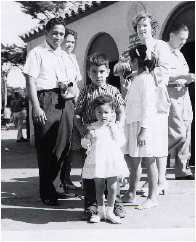
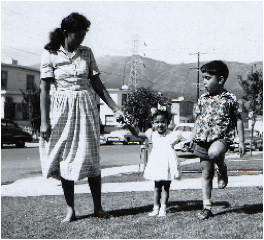
South
San Francisco - 1962
By now I worked two years with United Airlines and we were thinking of buying our own house and went house shopping across the bay in Fremont.
My cousin Karel had finally found a job and they rented an apartment in San Francisco.
We found a nice three bedroom house in Fremont across the bay. It was brand new and we bought it, $16,075. We put all our savings ($600) on a down payment. We were so exited about it, now we had a house of our very own, three bedrooms and two bath rooms, not a rental. What a luxury, both boys had one room, Maureen had her own room and so did Willy and I.
Life went on and we were happy. John and Maureen went to school and Willy worked during the day while I looked after Rudy who followed me everywhere I went like a shadow.
On August 21,1964 we were sworn in as American citizens, and shortly thereafter I obtained my FAA certificates. My future with United Airlines was now secured.
My cousin Karel, in the meantime went back to United Airlines, and this time he passed all the tests and started working for United Airlines. It was remarkable how he followed me and moved through all the same departments where I had worked, even the same lead groups and supervisors. He too had bought a house of their own in Sunnyvale. Their family had expanded and on Rudy’s birthday, they had a baby daughter named Carol, later followed by a boy named Vernon. Both our families were happy, and the future looked real good.
Rudy started kindergarten and the children did well in school. John joined the Boy Scouts and Rudy followed him, I became scoutmaster of this troop “Fremont 110” and would be for five years. Maureen was in the Campfire Girls and later joined the Fremont Youth Service Corps.
Willy an I both went to evening classes for citizenship, and on August 21, 1964, were sworn in as citizen in the Superior Court building in Oakland, California
On December 8,1965 we received word that my father passed away on December 7, and I obtained an emergency pass from United and flew to Holland to attend my father’s funeral. Willy stayed home with the children. The funeral ceremony was very impressive, my father was a knighted military man and he was given a full military funeral with the full military band of the Royal Guards and three platoons as honor guards.
Willy started a janitorial service which she kept for two years until one night while getting ready to start cleaning a paint store in Oakland, Willy got robbed of her purse by two young kids. The store was in a bad neighborhood in Oakland. This was the end of her janitorial service, and from then on Willy just did housecleaning only
Not long after we became US citizens, I obtained my FAA licenses and became an inspector at United Airlines and a year later was promoted to management as an Inspection Supervisor.
We moved to San Jose in another new house, and my mother came
over for a three week visit to the United States.
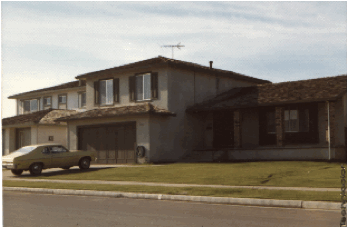
4077 Glouchester court, San Jose - 1972
I was glad that my mother finally could overcome her fear of flying and was able to come over and see with her own eyes how we were doing in America. On the night of her arrival we were all waiting for Rudy to come home from his part time job at a gas station. He was very late, and finally around midnight he came home carrying a big bouquet of red roses for Oma. My mother broke into tears and said ”.....Is this my little Rudy, you are so big now .....” then she hugged and kissed him...!
Rudy’s excuse was that all the stores were closed and he could not find a flower shop that was still open, so he had to drive all over the place to find flowers for his grandma...!! I have never found out how much it cost him, but for him it must has been a small fortune..!!
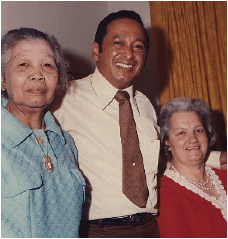
My Mother and us, San Jose 1973
I must say that my mother was very impressed, but most of all that she could see that her grandchildren had not lost their love for her.
After three weeks stay, I brought her back to Holland and on the plane she said that she was so thankful and proud and happy for all of us.
A year later I had to make the trip again, but this time to be at her side when she passed away. “Rest in Peace Ma you will be always in our hearts...!!” It was April 3,1976
Willy came over for the burial and we laid her to rest next to my Father.
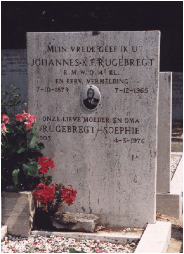
My Parents grave in the Hague, the Netherlands - 1976
The children grew up and one by one started to leave to go on their own in the world. We accepted it and let them go but were always there just in case, but they all made it well.
John was the first to go to Santa Barbara (UCSB).
He married Claudine Gans on May 1,1977 and they gave us our first grandchild, a daughter they named Erin, ChloĎ, Gans-Rugebregt. Years later Erin decided that she would like people to call her ChloĎ with was fine with us, it was only her name and didn’t changed the love we had for her, our first born grandchild.
Willy flew to Santa Barbara, to stay with John and Erin, as Claudine had to stay in the hospital wit a staph infection and was very sick from it. We decided that Willy would stay in Santa Barbara to take care of John and Erin for a couple of weeks and I would fly over on the weekend, to see my first grand daughter...!!!
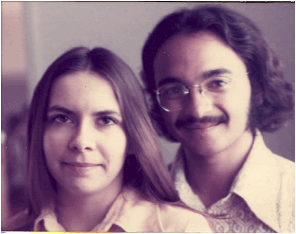
John and Claudine, Santa Barbara 1976
After three weeks Willy came home and we all decided that she
would take Erin with her, to care for her a couple of weeks.
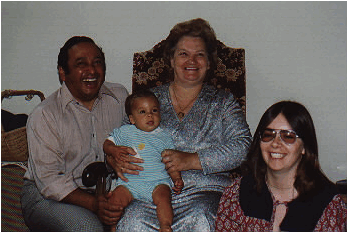
Our first grandchild, Erin ChloĎ Gans Rugebregt. 1978
Erin stayed with us in Half Moon Bay until Claudine came out of the hospital and was able to take care of the baby by herself. We all sighed with relief John and Claudine went trough a very traumatic time, and all we could do was stand by them and let them work it out on their own.
John and his family moved to Mendocino were he got a job at the high school as an English teacher, and so did later Claudine.
Maureen went to San Luis Obispo and graduated from CALPOLY as an architect and started her own firm in Morgan Hill.
She married Tom P. Galasco on the January 15, 1980. We lost a daughter but gained a fine son...!!!!
They settled down in Gilroy.
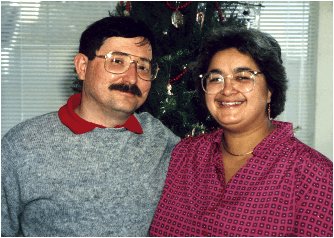
Tom and Maureen, 1980
Time went on and we once again moved closer to my work, this time to Half Moon Bay a town on Hwy.1 on the coast on the 4, of July, 1976.
This was a special “Fourth of July” for us. We were now eighteen years in America and I was at the peak of my career, seventeen years with United Airlines and thinking of retirement...!!!!
On April 30, 1981, Tom and Maureen had a baby girl, our second grandchild named Sara Louise Galasco.
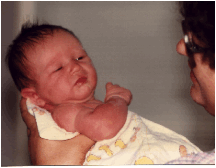
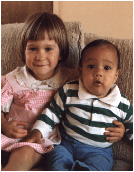
Sara Louise Galasco, April 30, 1981 Sara and Jeff, Half Moon Bay - 1983
Our third grandchild is a son named Jeffrey Thomas Galasco, born in Aromas and the apple of my eye..!!
Rudy went to college in San Jose, and after graduation did a stint in Saudi Arabia, working for a computer firm, and after he returned settled down in Carmel.
We sold the house and moved in a mobile home, and were trying to live in a gated community with all the rules and restrictions, but didn’t like it to much.
I had about two years to retirement, and started to prepare myself for it. I figured that I would retire at age 60, in 1985
One evening at work I got a phone call from Willy, something what had never happened in all my years of employment, unless it was an emergency. I guess she considered this more important than an emergency, and she sounded all exited and said: “Rudy was just home with a girlfriend and she is so nice....I hope he’ll marry her...He is coming home Sunday again on Mother's Day to meet the whole family....!!
On Mother's Day all the children and grand children came home for dinner and Rudy brought his girlfriend Luann Irene Slatta, and her mother Amy Slatta.
At the dinner table he announced that he and Luann had plans to get married...!!!
We were all happy about it and welcomed Luann to the
Family..!!!
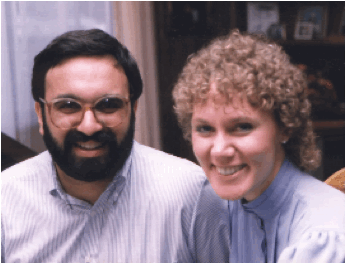
Rudy and Luann - 1984
We had a big family dinner with the whole family around the table and we introduced Luann and her Mother to Indonesian food.....they liked it..!!
It was a great day and at the end I thought..”Well there goes my last child out of the house on his own..they are all on their own now, but we will always be there if they need a helping hand..”
Rudy married Luann on August 18, 1985. They had the wedding ceremony on Hartstene Island, in Washington State.
All of Luann's family lived in the North West and her mother lived in Portland and the wedding ceremony was on “Hartstene Point” were her brother Jerry Slatta had a condominium.
The whole family went to Hartstene to attend the wedding
ceremony which was to be outdoors in a cedar grove, very nice....!!
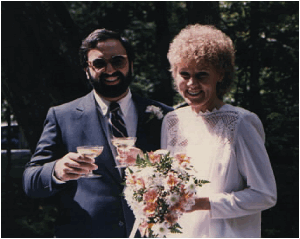
The Happy Couple....August 18,1985
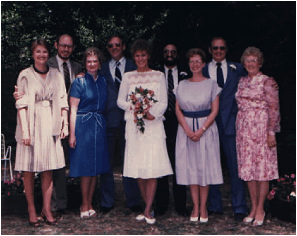
..the latest addition to the Slatta family....
After the wedding we stayed a couple of days and fell in love with the place, the weather was gorgeous and we enjoyed every minute of it, and decided that we would try to retire here .
By now I had made up my mind and was to retire on February 1985, after I took my six weeks vacation.
Now all the children had left the house and were on their own,
and we were alone with a good feeling that they were all safe and well settled
in the world.
Time to retire and enjoy life......!!!!!
I retired from United Airlines on February 28,1986 after
twenty-six years and four months of service.
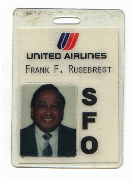
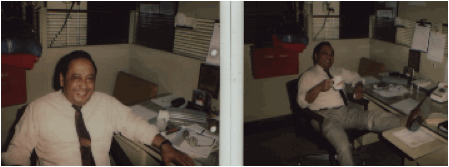
Last day at work
12-20-1985
2 hours to go........12-20-1985
On 12-20-1985 the crew threw me a farewell party which was great..!! The Shop Steward was the MC and from all over the turbine shop they came to say “Goodbye and Good luck” and I was really impressed. In attendance were the Vice President of Engine Maintenance, and several managers from the different departments, all of them I have known for years even out my inspectors and mechanic days.
I have been in the turbine shop since 1961 and have seen it grow from a small facility to the biggest turbine engine overhaul facility on the West Coast, with its own plating and machine shop and at the time of my leaving employed 1250 people. Here I was, 24 years later saying goodbye to people I have worked with for all those years. I was touched.... At the end they gave me a video tape with all the men who wanted to wish me well, it was a one hour tape and a video player-recorder to play it on...!!!
At six o’clock that evening, I walked out the gate with a heart full of good and thankful memories.
On January 10, we started toward Shelton, Washington to stay
at “Hartstene Pointe”. Here we would stay at Luann’s brother Jerry Slatta,
until we found a house to rent.
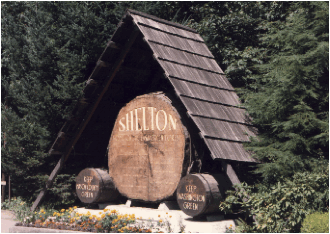
Shelton, Washington - 1986
We started looking around for a lot on “Hartstene Pointe” this
was a private gated community with its own facilities such as: a clubhouse and
attached cabana, an Olympic size outdoor heated swimming pool, a marina,
private beach and seven miles of wooded hiking trails. Wildlife was roaming
around freely.
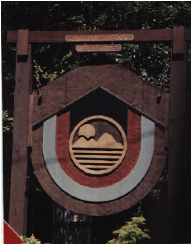
“Hartstene Pointe” - Shelton, WA. 1986
We found a place to our liking and bought it. I contacted a local builder and started to negotiate the cost and time to build the house. In the mean time I had made a drawing of the house, and gave that to Fred Burgdorff the builder, this was the house I wanted. After all the permits were obtained and papers were signed, the clearing of the lot could start. There were 18 big trees to be cut, all cedar and pine, and I figured that I would have fire wood for two winters.
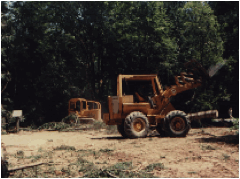
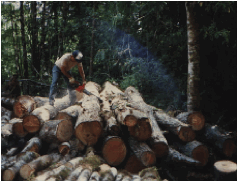
Cleaning lot 103 add. 4
Two winters supply of firewood, April 1986..!
In May 1986 they started on the foundation and the building of the house has started. We had no problems and the work progressed smoothly.
I was on the lot every day cutting up the 18 trees in 16 inch
logs and splitting and stacking them for firewood.
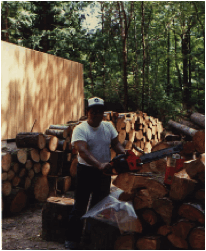
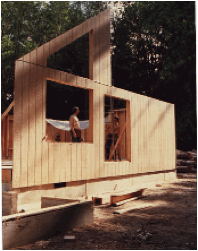
...Cutting and splitting.....1986
..another wall up.... Fred & Mike 1986
The weather was nice no rain and everyday I went to the building site to work on the woodpile cutting it up in 16 inch logs and splitting them for firewood, it kept me busy for the whole summer.
In November we moved in our new house, it was a nice and cozy house three bedrooms and two and a half bath, the master bedroom down stairs and the two other bedrooms with bath upstairs.
We had a brick fireplace with a wood burning stove, that kept the whole house warm all during the winter, we never used the electric heating system..!!
That first winter in our house was a pretty rough and colder
than usual according to the old timers.
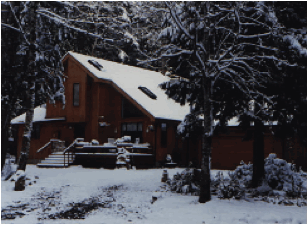
Winter 1987
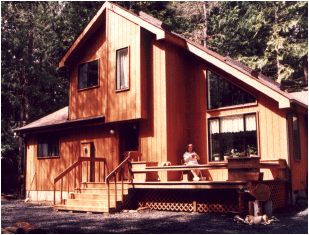
E407 Pointes Drive East, Shelton WA. April 1987
We lived on Hartstene Island for nine years and every summer Sara and Jeff came over for summer vacation. It was a wonderful time, and we enjoyed my retirement to the fullest, and made some good friends on the island and enjoyed life.
Sara and Jeff enjoyed their vacations and were always looking forward to come. There was plenty to do for them fishing, swimming, hiking and collecting blackberries, not to mention feeding the deer and the raccoons and squirrels that are roaming free. There was also a den of red foxes...!!
The summers are beautiful no rains, and beautiful sunny weather and balmy nights, but the winters are terrible, rain and rain and rain....!!
For me personally it was very depressing weather, and we were getting older and traveling to California was getting harder on our bodies, and we missed the children and the grandchildren a lot. It was such a tiring journey to California. We spend sixteen hours driving to Morgan Hill, and we were getting older and it was hard on the old bones!!!
We decided to go back to California and put our house up on
the market, but the housing market took a nose dive and we were not able to
sell the house. It took three years before we could sell the house
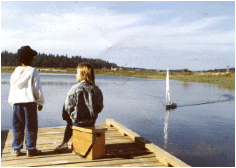
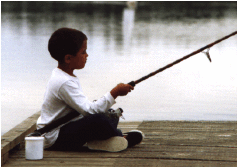
Jeff and Sara at the lagoon on Hartstene Pointe - 1987 and
1993
In January 1994 Maureen and Tom offered us to stay with them as they were going to build a “granny apartment” against their house in Morgan Hill. We could rented it until we were able to find another house. We gladly accepted the offer and made plans to move in June.
In March we had a visitor who asked us if we were still
planning to sell the house as we had taken it of the market. After she looked
the house over we made arrangements to sell the house and we were to be out of
the house by June 1, 1994.
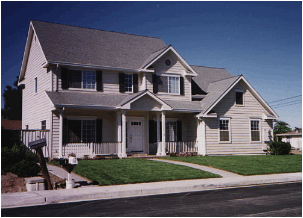
Peeble Ave, Morgan Hill
On June 15, 1994, we moved to Morgan hill, California, to the apartment Maureen and Tom had build against their house. It was a nice little apartment just enough for the two of us.
On the day we moved in, in the evening after dinner I had an accident with my radial arm saw and lost all the fingers of my right hand. I felt terrible that I did this to the family, but it was an accident. I stayed two nights in the hospital and came home June 17, 1994. I put all my strength and resources in my rehabilitation, and the wound healed well in spite of my diabetes. I went in extensive rehabilitation and worked and fought hard to overcome depression, and I succeeded.
Now I had to find another hobby as wood working was out of the
question, so I started to look for other hobbies to keep me occupied. Although
I could never fully adapt to using my left hand I learned to do so fairly well
but there are occasions that I miss my right hand a lot and realize that I
could not fully function with one hand. After 69 years of being right handed,
it was almost impossible to totally switch over to left hand use. Since I had
no right hand fingers anymore I had to pick up another hobby, and started model
airplane building, with Jeff. Life went on and we were happy in our little
apartment.
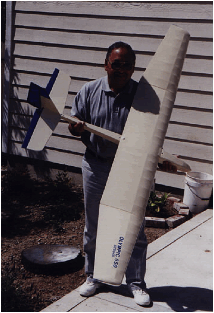
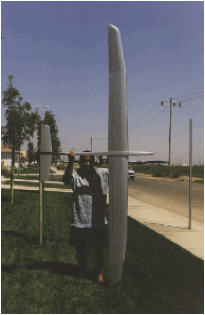
The “Oly 600” and the “Mystery Lady” - 1996
My good friend Ben Portier came over from Inglewood to spend Christmas with us and it was a great time. Sadly enough when Ben wanted to go home the 29, of December 1994, he suffered a stroke in the morning, while in the bathroom. We rushed him to the hospital were he stayed for six weeks, and afterwards he stayed with us until he was fully recuperated.
On January 10, 1995, I had reconstructive surgery on my hand and the carpal bones from my right index and middle finger were removed. This was a big improvement now I could make a fist and grab objects better. Ben was now recuperated and ready to go home, and we let him go back to Inglewood.
January 28,1996, Maureen told us the sad news that she had to sell the house for private reasons and asked us if we still wanted to buy our own place.
There followed a hectic time of house hunting but we had no luck in the Bay area, so we went looking for affordable housing in the San Joaquin Valley and ended up in the friendly town of Los Banos where we found a nice affordable new house and we bought it.
It took us four months to get settled in our new house!! But again we made it, and are now established in our new environment.
We love Los Banos with its friendly town concept and the folks are nice and helpful here. I stopped building airplanes and started oil painting with a senior citizens group and Willy is again in a crocheting circle and we love it.

1915 Place Road, Los Banos California - March 1996
I developed some health problems and on April 23,1997, and had to undergo heart surgery for a triple bypass.The whole family rallied together and was at my sickbed and I made it again...!!
I have to take it real easy. To keep me busy and also for hand therapy, I enrolled in an oil painting class for Seniors.
On January 23,1998 I underwent another surgery this time to remove my gal bladder, and again I made it...!! It has been a year since my operation now and things are going pretty well. Although after the two operations I did not felt like I used too, I think I’d never recuperated fully, and my health was slowly declining. To this day I suffer pulmonary problems and are very restricted in my movements, due to shortness of breath, but I'm still thankful for each new day....!!!
On April 28, 1998, Willy and I were married fifty years, our “Golden Wedding Anniversary”...!!
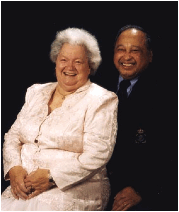
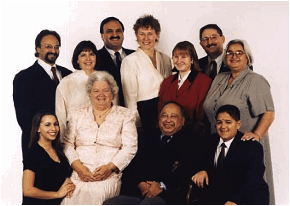
April 28, 1998 - Our “Golden Wedding Anniversary”
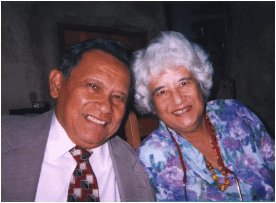
Karel and Etty Rugebregt
I had asked the children if we could keep it very private just the family, and so they did.
The whole family came together at Rudy and Luann's house in
Pebble Beach at lunch time, also Karel and Etty Rugebregt who have been so much
a part of our family, that Karel and I considered each other as brothers...!!!
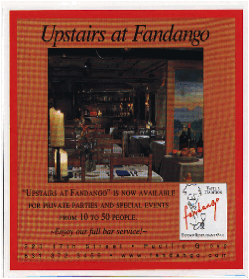
The restaurant were we had the family dinner.
It was a nice family gathering, and in the evening they took us out to a nice restaurant in Pacific Grove, named “Fandango” were we had a very nice dinner, with all the children, grand children and Karel and Etty.
It brought out some fond memories like when we all sat around the table in the first days in South San Francisco when Karel and Etty were just with us..... Looking back, we have come a long way...!!
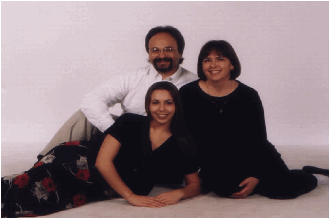
John, Claudine and ChloĎ - April 1998
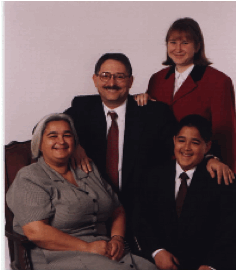
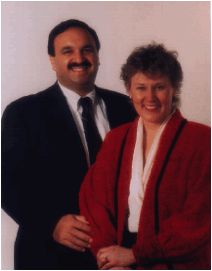
Tom, Maureen
Sara, and Jeff - April 1998
Rudy
and Luann - April 1998
As I looked across the dinner table and see all the family gathered together, I couldn’t help thinking of many occasions like this in years past, and thought: “..We must have done something right to be blessed with a family like this....Thanks kids for all the love and kindness .... Thanks Mom for making this come through.....Thank God for all the blessings.... To me a dream has come through... Life in these United States of America...”
I have never set foot on the place of my birth, and I think I will ever do so, as I am getting older and happy with my life here in America our “NEW HOMELAND”
Los Banos May 1999
~~~~~~